#Portraits To Inspire Composers
Explore tagged Tumblr posts
Text
le coup de foudre.


pairing: regulus black x reader.
song inspiration: my love mine all mine by mitski.
author's note: this was a result of me binging dune and call me by your name. whoever fancasted timothee chalamet as regulus deserves a forehead kith cause look at him. he's so boyfriend coded it makes me sick.

Regulus Black did not believe in love at first sight.
It was a foolish notion. One that contradicted his pragmatic beliefs. At his core, Regulus was a realist. In his world, love was not a luxury one could afford. Regulus was raised with the expectation to marry according to class, wealth, and most importantly, blood status. The noble and most ancient house of Black only took the purest of the pure.
After all, toujours pur, always pure, has been his family’s motto for centuries. There has never been any doubt in his mind that he’d marry another member of the sacred twenty eight. It wasn’t a matter of if, only a question of when.
During his sixth year, his mother made her intentions very clear. Walburga Black was adamant that he begin his search for a suitable bride. Leave it to his mother to compose a list of ladies she deemed suitable to become the future Mrs. Black. Regulus was to adhere to the carefully curated roster. They were names that he’d seen a million times before. Greengrass, Prewett, Rosier. Girls he’d grown up with and inadvertently had absolutely no interest in.
Still, his mother was insistent so Regulus complied. He took the girls out on dates. The formula was rather simple: dinner at the fanciest restaurant in town followed by a walk around the city square in which he offered to buy his date a dessert like the proper gentleman his mother raised him to be. Despite the fact that Regulus had the entire process down to a science, the dates were always unsatisfactory.
He was polite, of course. Opened the door, pulled out their chair, asked the appropriate level of questions to get to know his counterpart, but by the time the appetizers arrived, Regulus was on the verge of stabbing himself with the butter knife just to rouse himself from boredom.
Regulus placed no blame on the girls. They were only doing what their families had raised them to do. Sit pretty, chew gracefully, agree with his opinions. All while wearing breakneck heels and a smile to boot. It was all terribly fucked up, but this was the world they lived in.
The more he went on these dates, the more he realized that he didn’t want some pretty, docile wife. What he truly needed was someone who was willing to challenge him, to call him out on his bullshit, to argue with him when his own stubbornness prevented him from seeing reason. Regulus came to the horrible, earth-shattering realization that he probably wouldn’t find a woman like that on his mother’s list.
As he walked back from another mind numbing date, Regulus grappled with this newfound dilemma. He didn’t want to endure another one of these disastrous dates. He didn’t want to sit through an entire meal making small talk. He definitely didn’t want to disappoint another girl by not kissing them at the end of the night.
It wasn’t like any of them liked him anyways. Though they loved the idea of Regulus Black, he was quite certain that they wouldn’t afford the same affections to Reggie—the real and true version of himself. The one that Sirius often said Regulus kept in a neatly locked cage.
He wished he could be more like his brother. Sirius had always been the brave one. It was that infamous Gryffindor boldness that prompted his older brother to rebel against his family’s expectations. Instead of heeding to their mother’s ridiculous list, Sirius chose to date Remus in open defiance to Walburga’s orders. It resulted in him getting kicked out of 12 Grimmauld Place and burned off the family portrait, but Sirius didn’t seem to mind one bit.
In a lot of ways, Regulus envied his brother. Sirius had the guts to stand up for himself. He wasn’t burdened by the crippling pressure of pleasing their mother. In all honesty, Reggie wondered if such a thing was even achievable. As he brooded, Regulus found himself on the shores of the Black Lake. His body had taken him here on autopilot. It was his only place of refuge in the castle.
Regulus paced the rickety wooden dock. His mind was working so fast, so many thoughts spinning in his head, that it felt like he might work himself up to a fit. This has always been his problem. Sirius often said that he lived in his head too much. He frowned, trying and failing to get ahold of himself. For once, he wished he could just shut his brain off entirely.
Just then, Regulus felt a drop of water hit his head. He looked up and found dark, gray clouds hovering over the horizon. The stormcloud broke open and unleashed torrential rain all around him. Fucking fantastic. The world truly couldn’t give him a bloody break, could it?
With a sigh, Regulus began making his way back. The ground was sodden underneath his feet, his boots sinking into the sand and dragging behind his black coat. The waves lapped violently across the shore as the wind lashed against the murky waters. Regulus was almost at the edge of the beach when he spotted you.
A flash of movement from the corner of his eye. Regulus stopped dead in his tracks. There, at the mouth of the Black Lake, in the middle of the pouring rain, stood a girl with the most breathtaking smile he had ever seen.
Regulus was fairly certain that you had History of Magic together. He sat behind you in class, passed by you in the halls, even reached for the same book in the forbidden section of the library once, but Reggie had never once seen that smile. The gravity of it threatened to knock the very breath from his lungs.
There was something carefree about you. The way you spread your arms, tilted your head back, and laughed in the midst of the rain and thunder. Almost like you were welcoming the storm.
It was only when your eyes locked that Regulus realized he was staring. You cocked your head at him, trailing your gaze from the curls plastered against his cheek to the nice button down and freshly pressed trousers that were now soaked from the rain, down to the shiny leather boots that were now digging into the sand. You seemed amused at the sight of him.
Ever the perfect gentleman, Regulus snapped out of his daze and jogged over to you. Without hesitation, he raised his coat over your head to shield you from the rain even though you were already both drenched.
“What are you doing out in the rain?” Regulus asked, his voice full of genuine concern. “You’ll catch a cold.”
You stepped out of the refuge of his expensive looking coat and held your hand out, catching droplets in your palm. “I don’t mind. I just…I just needed to feel the rain on my skin, that’s all.”
You supposed it must’ve seemed strange to him, but the rain always made you feel better. Lately, life had been just a little too overwhelming. There was so much pressure to do well in classes, to hang out with friends while balancing your clubs and sports, as well as making time to write back to your parents. When it all became a bit too much, you tended to come to the Black Lake for some sort of refuge. The rain was just an added bonus.
If Regulus found your behavior bizarre, he didn’t say. Instead, he just smiled softly. “Well, you got your wish. It’s soaked out here.”
“I know,” you responded with an enthusiastic nod. “It’s nice, isn’t it?”
“Standing out in the pouring rain? On a beach where lightning can strike me down at any second? Yes, it’s absolutely splendid.”
Your mouth quirked in amusement. “No one’s telling you to stay out here.” You nodded towards the castle. “You’re more than welcome to take your brooding inside where it’s warm and dry. Not to mention, free of the dangers of lightning strikes, which are extremely rare by the way.”
“With my luck, I might be the poor one in a million git who gets torched while getting insulted by a pretty girl.”
“Did I insult you?’ you quipped back. “I hadn’t noticed.”
“You accused me of brooding.”
“I didn’t accuse, I stated. Even the Wizengamot would have to rule that you were, in fact, brooding.”
Regulus raised a brow. “What happened to innocent before proven guilty?”
“Unfortunately, the evidence is overwhelming and the verdict is set. You, Regulus Black, have been sentenced for glaring at the Black Lake so menacingly that even the giant squid refuses to come to shore. Off to Azkaban you go.”
“Do you promise to write me letters? Update me of how the world’s progressed without my dazzling presence?”
“It would be my genuine pleasure.”
Regulus chuckled at your dry humor. He couldn’t remember the last time he’d bantered like this with anyone, much less with a strange not-so-stranger. You sat down on the wet sand and patted the spot beside you with a grin.
“Why don’t you take a seat and tell me all about your troubles.”
Beyond the bleak horizon, the spires of the castle peeked through the gray clouds. Regulus thought of the common room where his housemates would no doubt be gathered around the ornate fireplace for warmth. Knowing his friends, they’d probably be indulging in spiked hot chocolate and playing some childish drinking game. A few minutes ago, nothing appealed to him more, but now Regulus found himself choosing the violent rain and soggy sand. All because of you, his mystery girl.
You leaned back on your elbows and cocked your head at him. “What ails you, Mr. Black?”
“That depends. How much do you bill per hour?”
“Fortunately for you, I’m in a generous mood so I’ll throw in a free session. Consider it my pro-bono work.”
“How kind of you,” Regulus said with a serious expression. “My brother’s been nagging me to see a mind healer for years. All that childhood trauma, you know.”
A small smile tugged at your lips, revealing a set of dimples that he found rather charming. “I can’t tell if you’re being serious or not.”
“My brother is Sirius. I’m Regulus, remember?”
You snorted in a very unladylike manner, which only made Regulus grin. There was something so unapologetically you in your laugh that was absolutely endearing to him. Regulus smiled and knocked his shoulder against yours.
You mimicked the action and smiled back at him. “All sarcasm aside, I was being genuine. If you want to talk about it, I’m here to listen.”
"Do you often offer therapy sessions to complete strangers?"
"Only to surly Slytherins with sad eyes and pretty curls," you quipped back. "And we're not strangers. I sit behind you in potions. We're practically best mates."
"You think my curls are pretty?"
"Like a little cherub's. Are you quite sure you haven't escaped from the ceiling of the Sistine Chapel? You look like one of Michelangelo's angels. Except with way more scowling." Regulus grinned. He got the feeling that you always said whatever you wanted, whenever you wanted. It was refreshing. "There's a smile. See? Our session is already progressing."
"I think you might get more than you bargained for with me, I'm afraid."
You met the challenge in his words head on. "Try me."
“You were right. I’m definitely guilty of brooding.”
“What happened?”
Regulus hesitated for a moment. He had never been the type of person to be candid with his feelings, especially not with someone he barely knew. Usually, he just kept his thoughts to himself and ruminated on them in the privacy of his dorm until he drove himself mad by overthinking, but your presence brought him an unexplainable ease. For once in his life, Regulus chose not to question it.
“I’ve had a long night,” he said, tucking his knees up to his chest. “I just got back from a date.”
“It didn’t go well?”
“It was…fine. It’s always fine. But it’s the same thing over and over again, just with a different girl.”
“I wouldn’t have taken you for a playboy, Regulus Black.”
Regulus chuckled. “I’m not some unscrupulous rake, I assure you.”
“Yes, that much is obvious from your use of the word unscrupulous.” You tucked your legs underneath you. “So why go on all of these dates if you find them so tedious?”
“It’s my mother,” Regulus explained. “She has this list.”
“A list?”
“Yes, a list of girls that I’m to court. Noble, pureblooded, proper ladies of society that my mother has deemed worthy of marriage.”
“You’re seventeen years old. Shouldn’t you be worrying about quidditch games and potions exams?”
Regulus nodded. “Yes, one would think. But my family has always been different. Since my brother left, my parents have been obsessed with grooming me into becoming the perfect heir.”
“How do you feel about that?”
He sighed. “Stifled. Exhausted. Smothered. I can feel the weight of their expectations weighing me down every second of every day.”
“I’m sorry, Regulus. That’s a terrible burden to carry.”
Regulus shrugged. “Others have it worse.”
“It doesn’t mean that your problem is any less heavy.”
To Regulus, the acknowledgement felt oddly validating. Even though you knew nothing of his circumstance, there was wisdom in your words and you delivered it delicately, like you actually cared to hear his troubles. You were devoid of the judgment he'd grown accustomed to and he found that rather freeing.
“It’s just…sometimes I think that I’ll never be the perfect son. My brother, he’s always been the brave one. Classic Gryffindor,” he said with an eye roll. You chuckled, but stayed silent. It was obvious that Regulus had a myriad of thoughts to unpack tonight and you were more than happy to just listen. “Sirius has never cared what anyone thought about him, least of all our parents. I admire that about him, but I just don’t think I’m wired that way. I care too much.”
“That’s not necessarily a bad thing,” you said softly. “Apathy is so common nowadays, finding someone who can admit that they care is refreshing. Though, I think it’s not without limits. You can’t please everyone. No matter what you do, someone is going to have something to complain about. You might as well be yourself.”
“That’s exactly the problem,” Regulus pondered. “All of these girls on my mother's list, I think they like the idea of Regulus Black, but he’s an illusion. It isn’t the real me.”
“Then who is the real you?”
“I don’t know,” he said honestly. “I’m just Reggie. I like playing quidditch and reading depressing literature and memorizing obscure history facts. I hate messy rooms and orange juice and anything that crawls.”
You smiled. “And what kind of girl does Reggie like?”
“Someone witty. Someone funny. Someone who’ll argue with me. Someone who doesn’t just nod and agree with everything I say."
"So what you're saying is that you don't want a nice girl?"
Regulus shook his head. "No, I think I need someone who challenges me. Who sees me for who I am rather than what I represent. Don’t get me wrong, I’m sure the girls on my mother’s list are lovely, but I don’t think they’d actually like me if they knew who I really am.”
“I don’t know, Reggie seems like a great guy. That Regulus bloke, on the other hand…” you scrunched your nose in disapproval.
“Hey!” Regulus chided, “I’m pouring my heart out to you. That took a lot of courage, you know.”
“You’re very brave, Reggie,” you said with a grin. “But you know what would be even braver?”
Regulus squinted in the rain as you stood to your feet. Lightning crackled over the horizon, illuminating you with an ethereal silver glow. You held out your hand to him. “Come dance with me.”
“Deathly afraid of being struck by lightning, remember?”
“Sorry, what?” You asked as you shimmied around him. It wasn’t graceful by any means. It was the goofiest thing he’d ever seen and yet he’d never been so enthralled. You danced without a care in the world and it made him genuinely laugh. “I can’t hear you over all the fun I’m having.”
"This is ridiculous," he said over the roaring thunder.
You shrugged. "Perhaps. But everyone's allowed to be a little ridiculous sometimes. Besides, I was asking Reggie not Regulus."
“Are you really trying to peer pressure me into dancing with you?”
“That depends,” you replied with a cheeky smile. “Is it working?”
Regulus conceded with a sigh and leapt to his feet. The youngest Black brother bowed like a proper gentleman. “May I have this dance, my lady?"
“You may, good sir.”
You grinned up at him as he took you by the waist and waltzed with you across the sand. Surprisingly, Regulus let you take the lead. He chuckled when you stepped on his toes and laughed even harder when you tried to twirl him. Towering a good foot over you, Regulus had to fully crouch for the maneuver to work.
Finally, you gave up the formality and just spun around in dizzying circles. There was absolutely no rhyme or rhythm to it. Just two idiots dancing in the rain with the biggest smiles on their faces.
Your coordination, or lack thereof, caused you to almost faceplant into the sand. Regulus yelped as you took him down with you. By the time you recovered from the laughing fit, the two of you were red-faced, out of breath, and laying side by side along the shore. He turned over to you and brushed a stray strand of hair behind your ear.
“That was the most fun I’ve had in years.”
“See? There’s more to life than just being moody and melancholic.”
“So this mystery girl of mine keeps reminding me,” Regulus said with a smile. “You never told me your name, by the way.”
“Wow, you don’t even know my name? I’m offended, Reggie. We’ve only been in classes together since fifth year.”
“I—we’ve never been introduced—”
You broke out into a smile and giggled. You thought it was cute that Reggie was so easily flustered. “I’m just kidding, Reggie.”
He sighed in relief as you stuck out your hand. “Y/N. My name is Y/N.”
Regulus slipped his hand into yours. He cocked his head, studying your eyes and your smile and those cute little dimples.
Y/N. The last name on his mother’s list. The one he saved for last because he didn’t know who she was.
The French had a saying—le coup de foudre. The infamous phrase translated to a bolt of lightning or love at first sight. Regulus had long dismissed it as flowery prose, but thanks to his mystery girl, he started to think that maybe the Parisians were onto something because meeting you tonight felt preordained. A date with fate. Like a bolt of lightning streaking through his dark, endless skies.
“It’s nice to meet you, Y/N.”
You grinned. “It’s nice to meet you, Reggie.”
Regulus smiled and laced your fingers together. He was frozen, it was raining, and he was fairly certain that you were both probably going to catch a cold, but he didn’t care. In that moment, as he stared up at the sky, blinking back the rain, and intertwining his fingers with yours, Regulus had never felt more content.
So no, Regulus did not believe in love at first sight, but love at second, third, and even fourth glance? He smiled a little as he gazed back at you, letting his gaze linger as he drank in that infectious laugh and sunny grin.
You made him think that maybe, just maybe, a girl like you could convert a skeptic like him into a devout believer.

#ok but when can i run my fingers through reggie's curls hm? when is it my turn to be happy?#regulus black#regulus black x reader#regulus black x you#regulus black x y/n#regulus black fic#the marauders#the marauders era
4K notes
·
View notes
Text

The Young Composer
Media: Digital
#digital art#lute#lute player#baroque#composer#digital illustration#character design#character art#bard#baroque inspired#digital painting#portrait#character illustration
0 notes
Text
JASON TODD VS. DABI: WHY NOT ME?
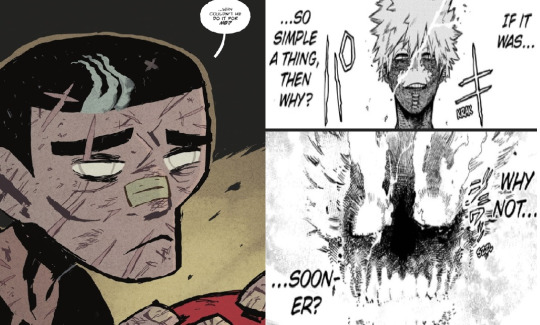
"You haven't been here long but you've seen him, right? The batman. The batman. He lives in darkness, to find the helpless and bring them into the light. So I have to wonder...why couldn't he do it for me?" The Boy Wonder: Issue #2
This is the story of the boy who didn't get saved. The story of a boy who really ought to have been saved. Of course, every victim deserves to be saved, but this boy was the son of a superhero. Can a hero who saves everyone, but fails to save his own son really be called a hero? As for the son, how does it feel to watch his father save complete strangers but let him fall to the wayside?
Jason Todd and Dabi are two characters with similar backstories and motives (so similar it's possible Dabi is outright based on Jason Todd) which are worthy of comparison. These are two tragic arcs which explore the conflict between a hero's responsibility to act as a father, and their responsibility to save people. As I said they are tragic because in both cases the hero fails, as a father, and a hero. However, I'm comparing the two because Jason Todd's story is a well written tragedy, and Toya's story is not.
If you were to write a story of my life, it would surely be a tragedy.
Aristotle's Poetics is the first attempt to define what Tragedy is, not as a story where sad things happen but a specific story structure. He outlines not only what makes tragedy, tragedy, but also what makes a good tragedy.
The Plot, then, is the first principle, and, as it were, the soul of a tragedy: Character holds the second place. A similar fact is seen in painting. The most beautiful colours, laid on confusedly, will not give as much pleasure as the chalk outline of a portrait. Thus Tragedy is the imitation of an action, and of the agents mainly with a view to the action.
I use this quote because the painting metaphor is a great way of explaining what I'm getting at, you can have a painting with the most wonderful colors, you can have a story with really good ideas like the Todoroki family plotline but if you don't use those colors correctly all you're going to end up with is a bad painting.
In poetics Aristotle clearly defines a tight well-structured plot as the first priority for effective tragedy, character as second.
Again, a beautiful object, whether it be a living organism or any whole composed of parts, must not only have an orderly arrangement of parts, but must also be of a certain magnitude; for beauty depends on magnitude and order. Hence a very small animal organism cannot be beautiful; for the view of it is confused, the object being seen in an almost imperceptible moment of time. Nor, again, can one of vast size be beautiful; for as the eye cannot take it all in at once, the unity and sense of the whole is lost for the spectator; as for instance if there were one a thousand miles long
To make sure you understand, it's vital in tragedy for all the pieces to fit together. Tragedy is a specific story format. Good tragedy uses the parts of a story well, but bad tragedy is sloppy and poorly put together. In tragedy, the whole has to be greater than the sum of its parts. The Todoroki Family are all good characters out of context, but the story could have enhanced their characters but detracted from them due to how poorly it is told. The fact that a lot of MHA fans are in love with the Todoroki family out of the context of the story, but also have constant complaints for how Horikoshi handles their plotlines is, in my opinion, very telling.
What Aristotle goes on to posit is the best tragedies do not come about by accident, but rather by the direct actions of the characters.
But again, Tragedy is an imitation not only of a complete action, but of events inspiring fear or pity. Such an effect is best produced when the events come on us by surprise; and the effect is heightened when, at the same time, they follow as cause and effect. The tragic wonder will thee be greater than if they happened of themselves or by accident; for even coincidences are most striking when they have an air of design.
Therefore Tragedies require consequentialism, like Newton's Third Law, every action will have an equal and opposite reaction. To simplify a good tragedy arises from the consequences of the character's actions (or inaction). The most basic form is that the hero of the story will have a tragic flaw that they fail to improve upon in time and then leads to their destruction. In essence, tragedy is where the hero fails. Not only does the hero fail, but the hero loses, and that irreversible loss is what defines tragedy. Medea slays her own children, Oedipus rips his own eyes off and deserts his kingdom, Creon Antigone is buried alive and Creon's son, her fiancee, commits suicide.
These events share two things in common, they are irreversible (hence why they feel like good endings), and two they evoke catharsis. Aristotle defines the goal of tragedy to evoke terror and pity. We feel alongside these heroes, Medea was abandoned by the husband Jason who she left her home and slaughtered her own brother for, Oedipus did all of his crimes unwittingly and is a victim of fate, Antigone was doing the right thing by burying her brother so his soul could pass on to the afterlife.
There's all different sorts of tragedies, Hamliet explores more here. I'd say UTRH and Hellish Todoroki Family are tragedies centered around grief.
Tragedy works on extreme emotions, and extreme hard-hitting consequences to the hero's failures. The worst thing a tragedy can be is boring.
The Tragic Hero
Now that I'm done lecturing you let's actually talk about both My Hero Academia and Batman like I promised. Both of these stories don't actually feature the central victim as their protagonist, and that is a feature not a flaw.
Rather, the story we are being told is that of a tragic hero, failing to save a tragic victim because of their own personal flaws.
These flaws are called (hamartia) or "error in judgement". A hero, being called a hero of a story is often unaware of his flaws which is central to what makes them unable to fix those flaws in time. That flaw can later lead to a moral failing, such as Othello's jealousy, initially jealousy is an understandable emotion, but then it leads to him trusting Iago over his own wife and killing his wife in a rage.
Most importantly, the hero’s suffering and its far-reaching reverberations are far out of proportion to his flaw.
Let's begin with talking of the heroes and their flaws, Batman and Endeavor. My main reason for comparing these two is in these specific stories they have the same flaw, inability to move past their personal guilt towards their son, and the same conflict the duty of a father versus the duty of a hero.
However, Batman functions as a tragic hero, and Enji does not. The summary of their conflict is right here in these two panels.
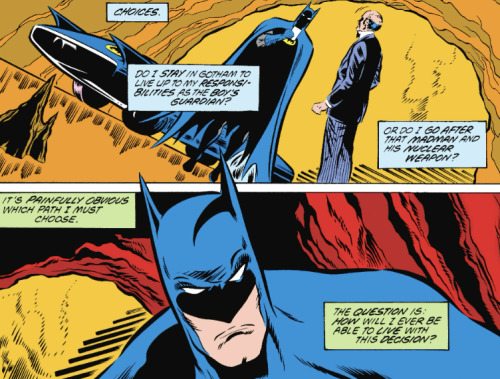
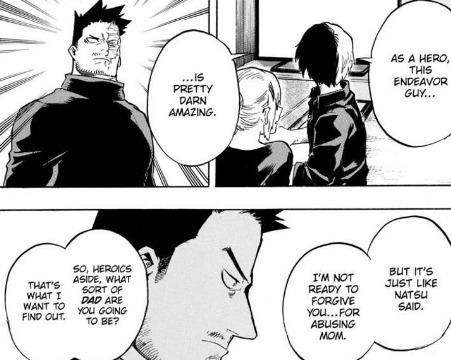
A parent is required to place their children above everything else, because they are the ones responsible for bringing that child into the world. Bruce Wayne made the decision to adopt Jason. Enji made the decision to have children, however with Enji you have the added insidious motivation of he only wanted to make designer babies and just didn't care for the ones who didn't turn out right.
Bruce attempts to do both, to act as a father for Jason and also a crime fighter as batman but he can't do both. This comes to a head in Death of the Family when Jason is having serious trouble because of his lack of a strong parental figure, and Bruce knowing that Jason is in trouble chooses still to go off and fight crime instead of staying with him. The choice to place crimefighting over the child they chose to take responsibility for has the unintended consequence of getting that child killed.
Whereas Enji makes the same choice over and over again, ignoring Toya's clear troubles at the fact his father no longer spends time with him and choosing to run away to the world of heroes because he doesn't want to face the fact that his actions are severely hurting his son. Bruce's motivations are more sympathetic admittedly he wasn't actively practicing eugenics, but the choice is the same and the consequences are the same.
Both Bruce and Enji are forced to bear witness to the deaths of their children when they are not there, specifically because they made a choice to be a hero instead of staying by their child's side. A situation directly caused by their choice to be a hero over a father, and a situation that would have been avoided if they had stayed with their child in their time of need. Jason runs off when Batman tells him to stay and gets kidnapped by the Joker, if Enji had been on Sekoto peak that day Toya would never have accidentally lost control of his fire.
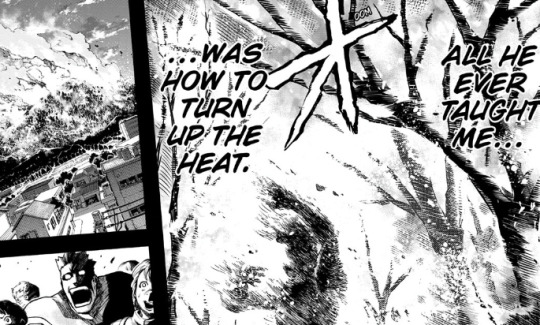
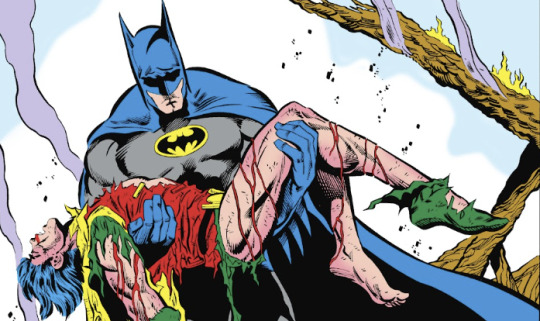
This is just the backstory however, the main event that kickstart this plot is the unexpected return from the dead of both Jason and Dabi. Each story follows the same plot beats. A new villain appears to challenge Endeavor / Batman. The villain reveals themselves as their dead son. Both Endeavor / Batman are given a chance to try reaching out to their sons, but they choose not to.
Then even though they are given a second chance with a miracle of a dead son coming back to them, they choose the exact same thing they chose before, being a hero and because of that the tragedy repeats itself. For both of them they are unable to save their son again, and the son goes through a second death. History repeats itself, the lesson isn't learned.
Their fatal flaw is their guilt. This is a story about grief and mourning after all, a son who is died, buried, but never grieved properly, never mourned, an open wound on the father suddenly coming back. The inability of each to process their grief blinds them from seeing the fact the son has come back, and they have a second chance.
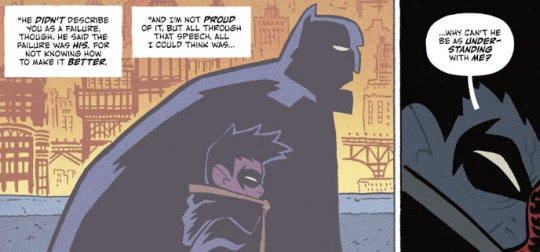
Toya has internalized he is a failure, because Enji literally called him that. Jason believes that Batman thinks he is a failure. In both cases the father is the one who failed, Bruce at least acknowledges this but cannot communicate it in any way shape or form.
This guilt and responsibility both Enji and Bruce feel causes them to self-sabotage. They no longer have the confidence they are in the right (they no longer feel like heroes because they have failed to be heroes to their own son).
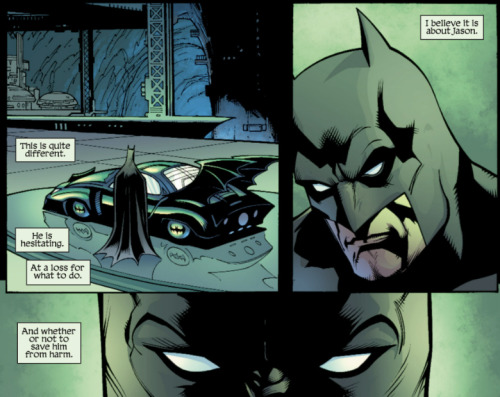
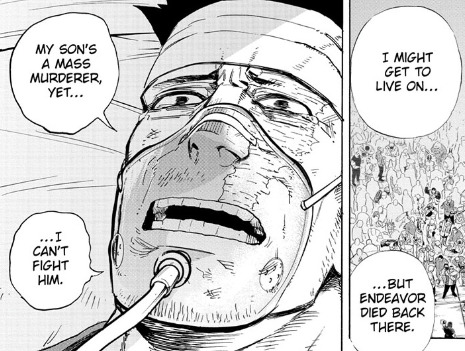
You can also add the layer of complication that since both men chose to be heroes in the past, they do not know how to handle the situation as a father now that they're being challenged to step up as one. Unfortunately, they are not the fathers that stepped up.
The reason their grief becomes a flaw is because they put their grief over their victims. . Each man is aware too much of their own failure, and while they should feel guilty they make the classic mistake of placing their own guilt over the feelings of the victim. The guilt they feel for causing the death and the genuine grief of losing a son is given priority over Jason and Dabi who you know... actually died.
An overwhelming grief and guilt is understandable because grief is a messy and human emotion, losing a child is an unimaginable tragedy that should never be inflicted on anyone.
Yet at the same time both Dabi and Jason are grieving to. This paradox that Batman only thinks of his own grief at losing a son and never stops to think about how Jason must feel leads to one of the best lines in Under the Red Hood.
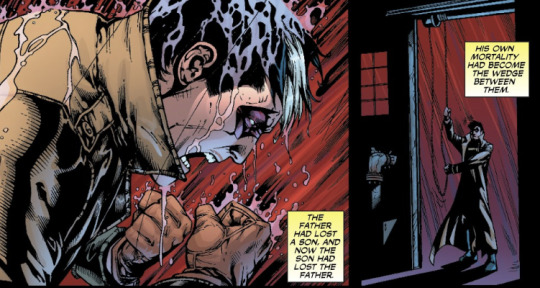
"The father had lost a son, and now the son had lost a father."
Batman's guilt is so strong over being the cause of Jason's suffering, that the suffering of the victim himself is ignored. To be fair to My Hero Academia, the Todorokis say a similar line to Enji.
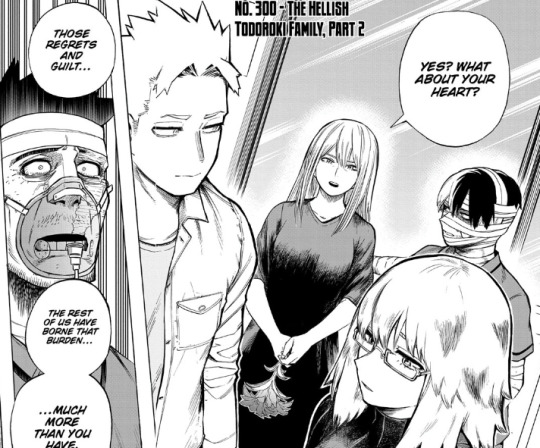
However, this is where I begin to get into the difference between ideas and execution. Tragedies are stories of actions and logical consequences, every action has an equal and opposite reaction in Under the Red Hood. Batman is punished for the choices he makes, the choices he doesn't make, and the choices he fails to make in time.
The Todoroki plotline features almost none of its character making any choices of substance, and because of that the plotline says the right things over and over again, but it all comes off as tell don't show.
I'm going to quote @codenamesazanka's post right here a couple of times because they describe the complete failure of the Todoroki plotline to show us a reason why we should be feeling things for the characters artfully.
We've heard Enji say this before - I'm sorry, I intend to atone. It's indeed the right thing to say, it's exactly what he should be saying and acting. Natsuo is declaring no contact - That's fine, I'm sorry, I accept this as part of my atonement and will continue. Touya calls him a coward - That's fine, I'm sorry, I accept this as part of my atonement and will continue. The public hates him - That's fine, I'm sorry, I accept this as part of my atonement and will continue. But you can only hear this so many times before you want to snap and beat the character, the story, the writing over the head with Enji's wheelchair. Why is that? He's behaving exactly as he should, and yet...
The reason why it fails to evoke strong feelings is because of what we'd called "narrative dissonance." The actions of Bruce and Enji are the same, they both neglect to do anything, make any real attempts to reach out to their victims because they're paralyzed by guilt.
However, we are told that they have entirely different arcs. Bruce's arc is a tragic fall. He's failing as a hero. While we are being told that Enji is experiencing an arc of atonement. Enji is supposed to be improving himself, and Bruce is supposed to be experiencing negative character development but they both do the exact same thing in story. Bruce neglects Jason, we are told by the story, by the characters in the story that Bruce is failing Jason. Enji does nothing in time to actually atone for Toya or try to help him, yet, we are told again, and again, and again, and again, and again, and again that Enji is atoning with nothing substantive to show us this is the case.
To show what I meant instead of telling this scene is in chapter 252.
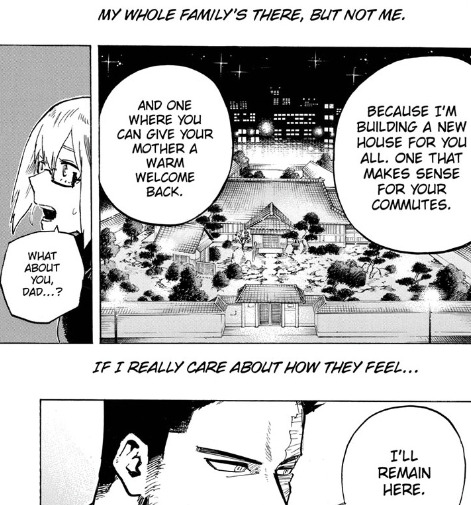
This scene is the ending point in chapter in chapter #426.
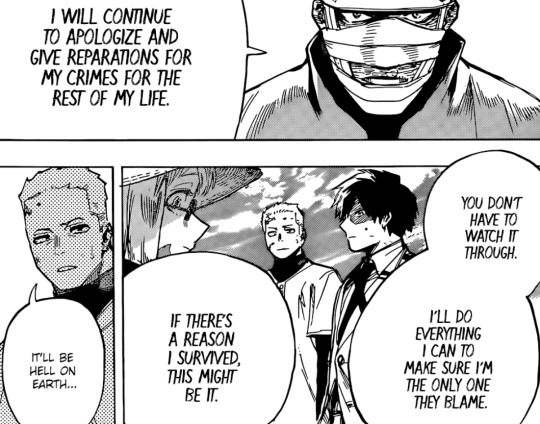
It's just him repeating the exact same sentiment and yet in a more than 150+ chapter gap, Enji never made any action to show he was now placing his family first. Enji didn't say anything to Dabi when he revealed himself as Toya. Enji didn't look for Toya in the months before the final war arc. Enji literally appeared on live TV in a broadcast that Toya was watching and said the very selfish "Watch Me" atone for the crime of creating Toya instead of literally talking about Toya or too Toya. Well, that would have rocked the boat too much... THAT IS LITERALLY THE POINT. Enji had to somehow break from tradition or make some significant sacrifice onscreen to his social standing to show that he's willing to put his family first. Enji decides to go along with Hawks decision to not face Toya head on, making the decision to be the hero for the final time which directly causes Toya to get up after Shoto brings him down non-lethally and make one last attempt to suicide bomb for his father's inaction.
Bruce does nothing for a long time in Under the Red Hood. He ignores his initial instinct that Jason came back and instead makes a long investigation on whether or not someone can come back from the dead in order to distract himself. When Jason takes the mask off, Batman already knew but was pretending otherwise because he didn't want to face the reality.
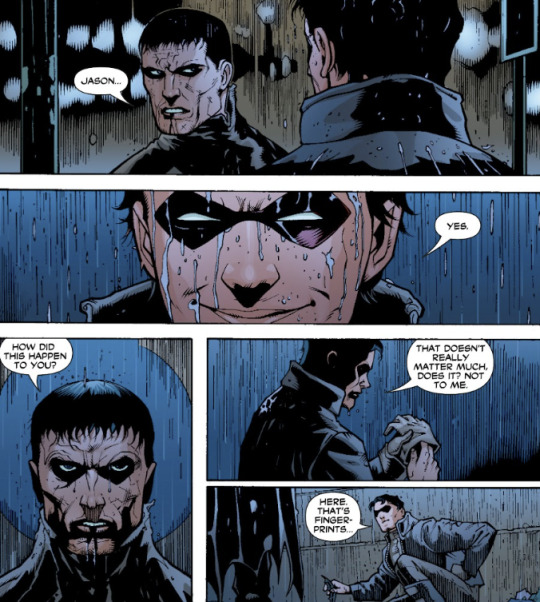
Even when Jason takes his mask off, Bruce still takes on the "I need to investigate this" angle even though Jason calls him out that deep down he already knows it's the truth. This of course foreshadows Bruce's underlying flaw, he doesn't want to face Jason head on because he feels too much grief about what happened to Jason and his guilt is more important than Jason's own grief. Just as the father has lost the son, the son has lost the father.
What follows is several chapters of Batman fighting crime as usual and making no attempts to directly search for Jason. They cross paths a few times but when they do Bruce doesn't follow. In fact, Bruce only shows up when Jason sends Bruce a sample of the joker's hair and Bruce knows that the Joker has kidnapped him out of Arkham. Bruce almost lets Jason get killed by Black Mask because he doesn't know whether to stop Jason or save him yet again, and then they have their final showdown where Jason has kidnapped the joker to demand Bruce kill him, and Bruce finally attempts to talk him down.
Out of context it sounds like I'm describing the same plotline, to the point where if you haven't read either, it looks like I'm complaining baselessly. Why is one hero doing nothing until it's too late good, and the other bad? The difference is of course context, or rather framing. Bruce's actions are called out by the people around him (Dick, Jason, Alfred) as him handling the situation wrong. Whereas both Enji's internal monologue and other characters say that he is doing his best to atone for his actions and deserves a chance, but the events we are shown in story are the exact opposite.
Here's another example to SHOW my point. Here's Dabi with my special, hardcover edition of under the Red Hood.
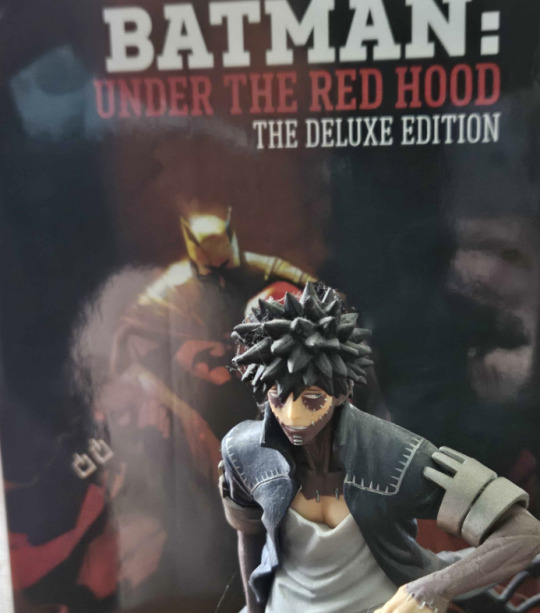
I reread the entirety of the fourteen chapter plotline and the majority of internal narrations come from characters outside of Bruce observing his behavior and commenting on how differently he's acting. Jason's backstory for instance is told by Alfred, not Bruce. Dick Grayson the first Robin comments on Batman's odd behavior. The rest are the third person narrator. Bruce has four instances of internal monologues spanning a few pages each in a 378 page story. (Alfred has the most internal monologues and he's presented as a more trustworthy unbiased narrator than Bruce, to get us to question Bruce's actions).
"Information travels on many routes, sometimes it comes predictably like the tides. You just need to know where to stand and meet it. Other times it's elusive and you have to root through the garbage to find it. In the last few years I've come to rely on Barbara Gordon, Oracle, we all did. Utilizing every form of surveillance equipment she has been the eyes and ear [...] but those days are over. I can't rely on anyone anymore. [...] and tonight it's also about the company I keep. It's different with him [night wing] out here. I think about when he was younger, when I was younger, it was different, simpler and I miss it. I miss those days, for that it's hard to be around him.
This first internal monologue is a case of unreliable narrator, because as soon as finishing it Dick Grayson / Nightwing shows up, offers Batman his help and while Bruce at first refuses it the two of them are forced to work together to fight Amazo. What does this show us? Bruce is not alone, but Bruce actively acts like he's alone ignoring the feelings of the other people around him. It exhibits a flaw of Bruce and the bad headspace he is in mentally (if I remember correctly Stephanie Brown recently died in the comics while this storyline was being published. It establishes Bruce's improper coping mechanism with grief, and how he is going about it the incorrect way.
Bruce says I work alone, and then Bruce says it's easier working with Dick, I miss it, but I can't go back to those days. It's bruce's contradictory thinking patterns in the same chapter that stop him. it's bruce's fault he cannot connect to Dick, and he is actively mourning the past because his relationship with Dick has changed.
Now the final part of the monologue in that chapter.
He's quick. Not just fast, agile. He's not thinking about his next move, he's just making it. He's been trained well. And there's something about him. Something familiar. There was something interesting about before he cut the line, before it had been taught. That had to have been practiced. Either that or just plain dumb luck. No it's not luck.
This is the first hint that Bruce already suspects it's Jason from early on but is in denial about it. This unreliable narrator trope also gives an agency to Bruce's decision, he is actively choosing to ignore the possibility that it's Jason because it doesn't want it to be.
Whereas, a lot of Endeavor's plot takes away any agency from him. For example, he doesn't even know that Dabi is Toya, because if he had the sneaking suspicion and ignored it like Batman did that might have made him look bad. We can't have the main character in a tragedy looking bad now can we?
The second monologue is more denial.
That device is from Kord industries. I should know. Ordered it special from them. How can he have it? No more dead ends. No more questions. No more guessing. Tonight I find out what is passing for the truth.
Reading between the lines this is outright confirmation Batman already knows.
The third is a brief reflection in his feelings for Jason.
The armor has to be light enough to fit but strong enough to protect. But sometimes a great many times, it's not strong enough. It wans't strong enough for Barbara who has to fight from her chair. It wasn't strong enough for Stephanie, other dear soldier enough dear grave. And it wasn't enough for Jason. Willful Jason. Who ignored the danger. Who spat at risk. Who was never frightened enough. I've always wondered... always... was he scared at the end? Was he praying I'd come save him? And in those last moments when he knew that I wouldn't. Did he hate me for it?
This monologue directly shows without stating it outright, Bruce is prioritizing his feelings of grief and failure mixing them in with his genuine grief over the loss of a son. it's selfish of him, but grief is a selfish emotion.
Here's the thing Bruce is allowed to be selfish and to not have the correct reaction to his grief, because the whole story is centered on Bruce being unable to get his shit together in time, and this picture into his emotions is an explanation as to why. Bruce is afraid of being hated by Jason. Jason of course has every right to hate him for failing as a father, but still I think not wanting to be hated to a person you loved so much and feel genuinely sorry over what you let happen to them is an understandable reaction.
Meanwhile we have Enji saying repeatedly all the right things in his monologue, the selfless, I don't need to be forgiven, it's okay if they hate me, I just need to atone but he never actually does anything. There's no explanation for why he isn't doing anything either, so that narrative dissonance. We're shown why Bruce doesn't act in time, he's internally a mess to be frank. We are not shown why Enji doesn't act in time because his internal monologue tells us again and again he's committed to atoning and he understands what the right thing to do is.
As Codenamesanzanka says:
Enji is still saying all the right things, but the story isn't giving him the opportunity to actually do the right things. To have his new actions matter. I have no doubt about his sincerity in his mantra, but without the 'show', it's hollow. Similarly, "Let's talk" is actually kinda bullshit too, because it's so vague. This is less about Enji, and more about the writing, how it set up this scene. "Let's talk" or "I want to talk" or any of that variation is repeated 6 times, without anything more or specific added.
There's an excess of repetition of Enji saying he wants to atone, he's ready to atone, without any of that materializing in the story.
As @class1akids says in this reaction post:
It also feels also super-hollow to say he's sheltering the family from the fallout, after they've just talked about how Fuyumi lost her job (and got a new one through the connections she herself built). How is he going to do that?
The fourth because I don't want to write it down, it's just Batman monologueing on how his partnership with Jason is still good and explaining the technical details of his fight with count Vertigo. It's in chapter 10 if you must look it up.
So four monologues total. Two monologues establish indirectly that Batman knows that Red Hood is Jason and doesn't want to face him. The third monologue establishes why he doesn't want to face him, he's afraid of being hated. The monologue is in line with Bruce's actions in the story, Bruce investigates several ways of reviving from the dead instead of looking for Jason.
The character's reactions around Bruce are also talking about how he's not acting like himself. Especially Alfred's who speaks of Bruce's indecision, on whether to put a stop to or save Jason.
"It is curious. He is lost in thought. It is not like him to spend vast stretches of time immobile, where his mind is gripped in the solitary process of deduction. This is quite different. He is hesitating. At a loss for what to do. I believe it is about Jason. And whether or not to stop him or save him."
This is illustrated in two scenes later where Jason spends a long time simply watching when Jason is fighting enemies, first in a fight against Captain Nazi, and second Black Mask. Jason even gives a direct callout of that behavior.
Jason: What the hell took you so long? Couldn't decide if you wanted to let me live. Batman: Shut up and fight.
Observed by Alfred Bruce is completely stalling and can't choose, observed by Jason Bruce can't decide whether to let Jason live or not. Bruce hesitates twice. We know why. We see it in action. It's called out as flawed behavior.
Now let's cover all the tell that don't show that is Endeavor's many monologues.
Pro Hero Arc:
I have to safeguard the future for them. That's the job for whoever's on top. What about the lives I cut short? Just demanding forgiveness isn't enough, it's too late for that. At this point I need to atone there's no other route.
Hellish Todoroki Family 1:
I'm trying to make ammends going forward. It might be too late. but I fall asleep every night thinking about it. Lately it's been the same dream. The wife and the kids looking happy at the dinner table. But I'm never there with them. It might be too late but I fall asleep every night thinking about what I can do for my family. I wish you could be here too, Toya. It's always the same dream. My whole family's there but not me. If I really care how they feel [I'll remain here].
I'm not going to read 200 chapters so I'm just going to ballpark it based on memory. Here we go.
Dabi's Dance:
My eldest, Toya didn't harbor frost within him. He didn't have a way to overcome the inescapable downside of overheating but I nevertheless sought to raise the boy as a hero. [...] Because Toya had more potential than me I placed my ambitions on his shoulders. I thought it could be you. You could have been the one to reach my eternal goal. My frustration... My envy... The ugliness in my heart... you could have been the one to smash it all to dust.
Plot twist this is the only monologue I like. It's different from all the others, and it's the only one where Enji is being emotionally honest. He put the emotional burden of his own emotional insecurities on an eight year old child, and expected to live vicariously through him and when Toya failed to live up to those expectations he just abandoned him. It alligns what we have been shown so far, Enji is not acting like a reptentant man here who realizes the harm he's done to Toya and only thinks of Toya as an extension of himself and his own regrets.
The Fight Against AFO:
My mistakes took the form as Toya leading to many stolen futures. The past never dies. Rage, resentment and even penace wound together toward the future. And the future is a path for the young. A path with so many branching choices. That's why I must win this. [I'll keep paying my penance. I'll win today and keep my eyes on Toya.]
When Enji decides to double Suicide with Toya:
I take full responsibility. I swore to bear the burden and live my life atoning for it all. However, you've been watching me all this time. While I couldn't be there to watch you. You were someone I especially needed to do right by. No I can't let you meet your end alone, but I won't let anyone else get caught up in our tragedy.
Hellish Todoroki Family Final:
I came to talk about what's to come. I'm retiring as a hero. That was my initial plan even before the war started, but now I can't even walk on my own. The hero endeavor burned to death. Your flames were really stronger than mine. [...] You're right. You know everything about me, Toya. After all you were always watching me. And you wanted me to do the same for you, but I didn't. Not matter what anyone says your heat does come from my hellflame. From now on I'll come everyday, so let's talk. It's too late now, so let's talk. [...] You're free to hate me. Anything is fine really, so throw it all at me.
This one is spoken dialogue but it's still a four-page long monologue. Every one of Enji's monologues with one exceptionsays the same thing: I'm sorry, I'll spend the rest of my life atoning for my actions.
We're repeatedly told Enji is atoning but he acts like Batman. Then, his actions should be framed as Batman, not atoning but avoiding any responsibility.
As observed by Class1akids when we were discussing the update:
Everyone else faces an uphill struggle with their lives, but we should all feel sorry for Enji atoning and being in hell. I hate Hori's compulsion to over-write his abusers and over-explain their atonement. He does this with Bakugou too but with Enji it's more irritating. It was so much more enjoyable when he just wrote the thing but didn't point at them and say -> look, they are atoning. Aren't they soooo cool??
Enji's internal monologues and the other characters frame him as some sort of martyr, while on the other hand it's clear by both Batman's actions and Alfred's observations he's not acting like his usual self. In fact, this is an interpretation of Under the Red Hood that I love from the writers of the video game Arkham Knight that does a less tragic retelling of Under the Red Hood:
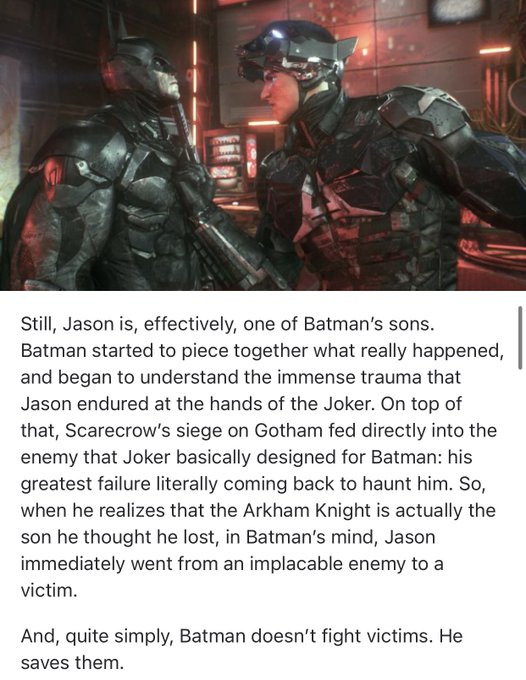
Batman doesn't fight victims. He saves them.
Therefore if Batman is fighting Jason, a victim, he's not acting like Batman. I'm also fine with Arkham Knight being an Under the Red Hood retelling because it's a different story. Comics do this all the time, different universe versions, popular storylines adapted into different mediums. It also works as a commentary on the original story, by showing what Batman could have done to lead to a more positive outcome it makes Batman's choices in Under the Red Hood worse and more tragic because he could have saved Jason, there was still a chance.
So here we have two flawed tragic heroes who are meant to be both pitied and condemned for their actions. One of them is all pity with no condemnation. The other is both pity and condemnation, Batman is grieving, but also he's failing his responsibility towards Jason. Therefore one protagonist works, the other fails utterly.
I'm not saying abusers don't deserve redemption. I'm not saying Enji should have died in order to atone. I'm not saying that the underlying problem with the arc is that they decided to make Enji sympathetic and a focus of the arc. The most important problem is the breaking of one of the fundamental rules of storytelling: Show, Don't Tell.
The Tragic Villain
Not only does The Hellish Todoroki Family plotline fail to make Enji a compelling protagonist, it also fails it's biggest victim. Now, these are both stories that end with the hero failing to save their victim. So if both of these stories have the same ending, why am I saying it failed Dabi, but not Jason?
Well, let me explain.
Dabi and Jason are both villains turned victims. The stories themselves are about this ambiguity. How much should the be held responsible for their own choices? If they are actively harming innocent people, then shouldn't they be stopped? Should they be automatically be forgiven just because of the pain and grief they've suffered, even if they've been causing it to others?
Both characters are also reflective of their fathers because they are too being selfish in their grief, they want their grief acknowledged and so are violently lashing out.
Jason and Dabi both make plays at being vigilantes at first, Dabi wants to inherit Stains will, and Jason Todd wants to be a better bat-man by taking control of the drug trade in Gotham and cutting crime down by executing gang heads. However, neither of them are being honest with this and it's shown through their actions, both of them abandon their original plans.
In the final showdown all Toya cares about is facing Enji on the battlefield, and when he's on the brink of death his mind erodes to the point where all he can do is scream for Enji's attention while his flames get hotter and hotter.
Let's take about Jason first and how his narrative treats him a whole lot better and more sympathetically, with more humanity than Batman. Jason is still held responsible for his choices, he is criticized by Bruce for murdering gang leaders and passing it off as justice. He's also blatantly shown to be a hypocrite. My favorite scene from Red Hood: Lost Days, the official UTRH prequel.
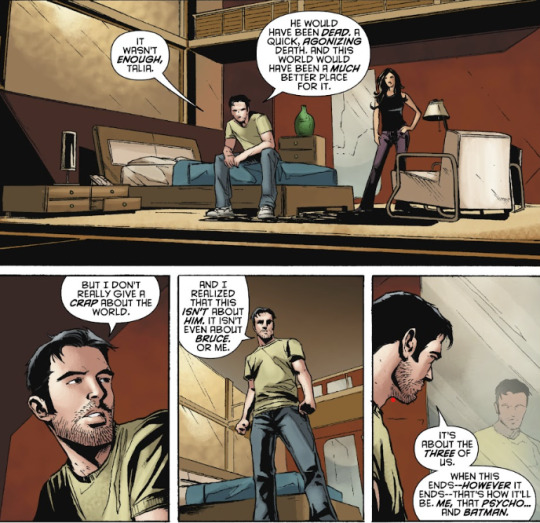
"I want to kill the joker in a cool way. Just sniping the Joker from a rooftop isn't dramatic enough for me."
This scene, and the final scene of UTRH underlines Jason isn't executing criminals because he believes it's the right thing to do, or because of his stated motivation that killing the joker would prevent more future victims.
Instead his every action is to set up a scenario where he makes a selfish demand of Bruce. He wants Bruce to prove to him that he would choose him over being a hero, by setting up his final scenario. Him, the Joker, and Batman. Jason will shoot the Joker. Bruce has a gun. He can either choose to let Jason kill the Joker, or kill Jason to stop him, either way it makes it clear what Bruce's priorities are.
The underlying reason for this is similiar to Bruce. Just like Bruce, Jason is deeply afraid that Batman doesn't love him. That he thinks of him as a failure. (This is Toya's main reason too).
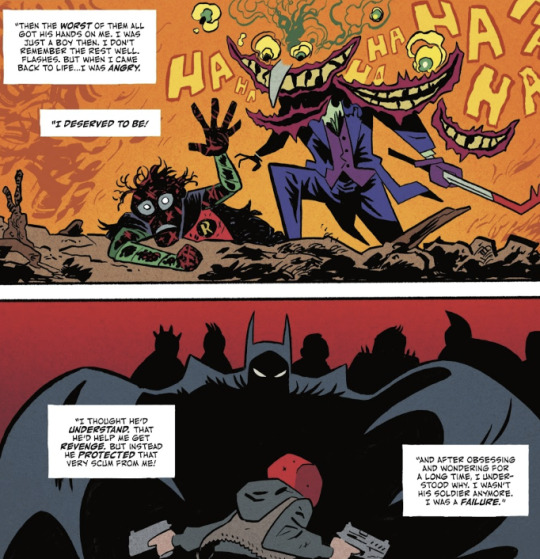
He also interprets Bruce's failure to avenge him to mean that Bruce didn't even care enough to mourn him. If Bruce loved him enough, he'd choose him over the joker, but he's so afraid that Bruce doesn't love him enough that he's going to force Bruce to choose.
Along the way he's also going to behead several crimelords in order to put an exclamation point on that point.
The way Jason completely unravels in the confrontation shows this insecurity, he begins with monologueing about how batman should totally kill people, until his fear that he wasn't important enough, and his grief at losing his father is revealed.
Batman: I know I failed you, but I tried to save you. I'm trying to save you now. Jason: Is that what what you think this is about? Your letting me die. I don't know what clouds your judgement worse, your guilt or your antiquated sense of morality. Bruce, I forgive you for not saving me. Jason: But why on god's green earth is he still alive? Ignoring what he's done in the past. Blindly, stupidly disregarding the whole graveyards he's filled with people. The friend's he's killed. I thought killing me - that I'd be the last person you ever let him hurt. Jason: If it had been you that he beat to a bloody mess. If it had been you he left in agony. If he had taken you from this world. I would have done nothing but search the planet for this pathetic pile of evil, this death worshipping garbage, and sent him off to hell.
Direct statement, it's irresponsible of Bruce to let Joker live after killing Jason and should have put him down to prevent future victims. Reading between the lines, Batman not taking revenge for Jason is a sign that he didn't love him enough, Jason loves Batman more because he would have taken revenge.
As the confrontation continues and Jason's mental spiral worsens, to the point where he can't keep up his pretense of self-righteousness.
Jason: I'm not talking about killing cobblepot, or scarecrow, or riddled, or dent. Jason: I'm talking about him. Just him. And doing it because...he took me away from you.
The father had lost the son, and now the son had lost the father.
Jason's revenge is just a cover, for his grief at losing Bruce. I think this also shows a really positive aspect of Jason's character to humanize him instead of condemning him for his actions to ignore or even justify the suffering he endured: Jason really loves Bruce.
I mean how meaningful is the statement: "Bruce, I forgive you for not saving me."
Bruce has been afraid to hear the whole time that Jason hates him, that he won't forgive him, but Jason loves him deeply. In fact his love is almost equal to his rage because Jason is a deeply emotional person, and these little details make him human and not just like a plot obstacle that Bruce has to face. A metaphor for his past failures.
Dabi is drawn as a crying boy who wants comfort, Jason is shown to be a crying boy who wants comfort through both dialogue and action without us directly needing to be told. It's a heartbreaking line and doing it because he took me away from you and it lands perfectly because the narrative wants us to just look at Jason's grief. It doesn't add an asterisk* even though he was in pain, he's done unforgivable things that can't be justified to undercut Jason's suffering.
In fact that might be another underlying problem with The Hellish Todoroki Family, the narrative tries too hard to make you feel a certain way instead of just presenting things as they are to make you come to your own conclusion. UTRH doesn't support Jason's revenge based serial killing of villains. It doesn't say he's justified to cut off the heads of mobsters. However, it doesn't excessively state "Well, I'm really sorry what happened to you but what you've done can't be forgiven" so we don't have to challenge ourselves to feel too much empathy for Jason's suffering.
Meanwhile even when Toya tries to express his rightful anger and grief, we're always met with someone shutting him down and saying well yeah, but you're wrong, involving innocent people is unforgivable.
As said by @stillness-in-green in the replies to this post:
I think so much harm (in-universe, but the state of the Twitter fandom makes me think the messages are pretty toxic irl, too) comes out of portraying the Heroes as needing to weigh in on the *morality* of the Villains' actions before they gauge "saving" them, when that is not a thing that glorified cops have any business thinking they have the right to do. Demanding repentance before the rehab is so bizarre.
You can say someone's actions are wrong without using it as a factor to consider whether or not their suffering as a human being should be acknowledged, and like I said there's multiple instances of people just yelling at Toya how immoral he is instead of addressing the elephant in the room.
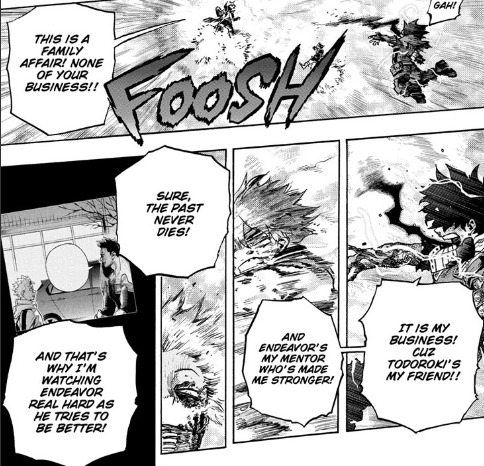
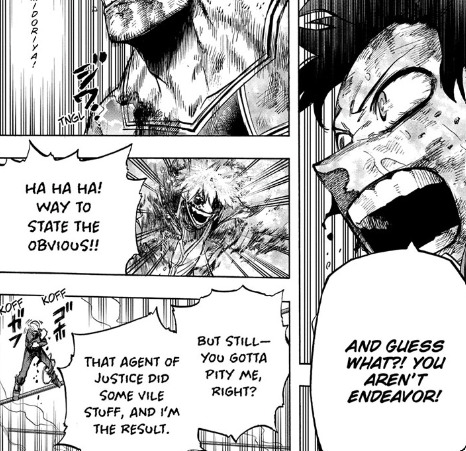
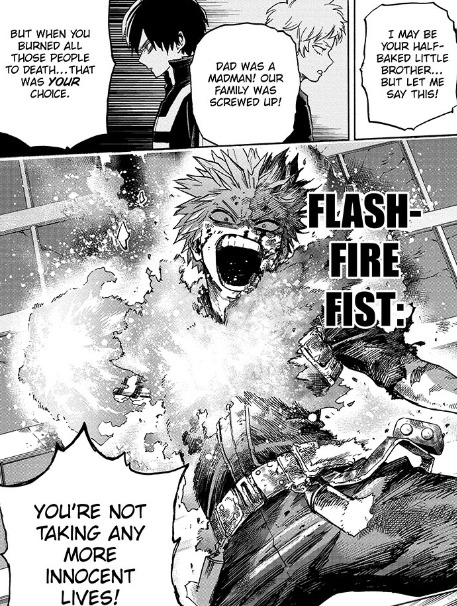
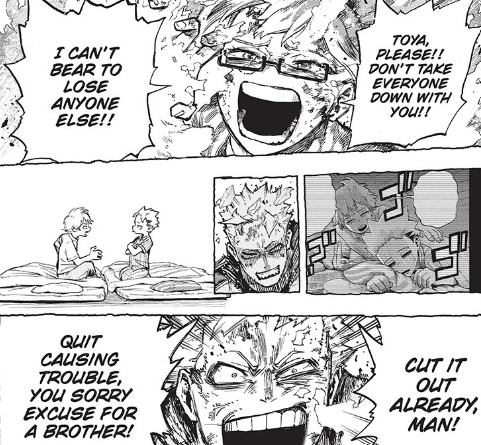
You're wrong, you're wrong, you're wrong, you're wrong.
(Okay, I understand that some people have interpreted this as a show of Honnae and Tatamae, the Todoroki's who are a very repressed household are finally talking about their feelings even if those feelings are selfish and ugly).
(I'm not criticizing Shoto for saying that the people he killed were his own choice necessarily, Shoto is a character who's actions need to be read more deeply than his words he was dedicated to bringing Dabi down without him burning himself any further start to finished. My criticism lies in the fact that Hori uses Shoto as a mouth piece because he thinks we need to be reminded that murder is bad).
However, even acknowledging that time and place man, time and place. They couldn't have done that in the aftermath, when Toya isn't burning to death?
Hey buddy, you're being selfish.
Toya: AHHHHHHHHHHHHHHH I'M MELTING, I'M MELTING.
This is I feel the underlying problem with the way the arc is written, not because the Todorokis are a very traditional Japanese family and there are cultural reasons they express their emotions differently, I'll give a caveat to that it's a nuance I might not understand.
However, I am arguing the actual problem is tell don't show. Horikoshi thinks that we as an audience need to be told multiple times that murder is bad, and we cannot be trusted to interpret that on our own.
Under the Red Hood shows both sides of Batman and Jason's debate, and let's us just come to the conclusion that Jason is in the wrong because revenge isn't justice. Horikoshi reaches no shit sherlock levels of telling us that we're not supposed to approve of Dabi's murders.
it's also a matter of giving Dabi narrative space to express his feelings, like every time Dabi tries to talk he is continually shut down (Shoto does engage Dabi talk to him and listen to why he didn't come back though I'll give him that) and it seems to be to push forward this weird idea that you shouldn't sympathize with the pain Dabi has endured or the ways he's dehumanized unless he does something to prove he deserves to be treated like a human being first.
Jason gets to monologue and make an entire argument, and his argument also shows the depths of his love for Bruce and what a deeply feeling person he is, and how those feelings being hurt and twisted could logically lead to his lashing out.
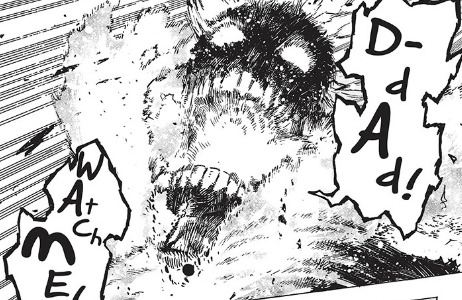
Compare this to Dabi who doesn't get a final monologue, but is instead reduced to a completely mindless state where he just cries out for his dad's attention. He doesn't get to make his argument.
Jason and Dabi both choose to blow themselves up, but Jason gets enough character agency to show this is a deliberate choice he's making even if it's the wrong one. He retains his character agency and ability to make decisions until the end of the narrative.

Jason's also you know physically crying. The end result of the narrative is about wrong choices that both Bruce and Jason make together, and then suffer the consequences together. Bruce watches the same failure play out again and he isn't able to save Jason, Jason doesn't get what he wants, he doesn't get revenge and he doesn't get to reunite with his father. It's tragic for both of them, and brought about by decisions both of them made.
Whereas yes Dabi makes a lot of bad decisions leading up to the last war arc, but in the end his final fate is up to a choice Enji made to not face Toya in the final battle.
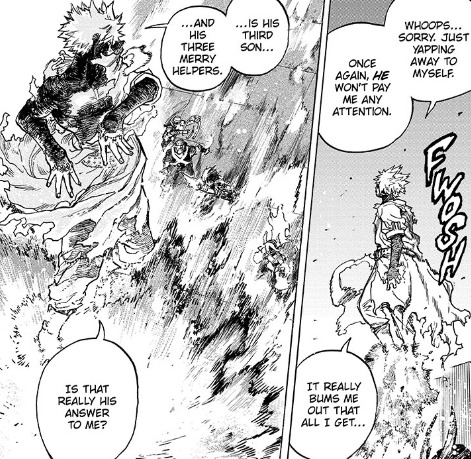
However, while the final consequence of the battle is brought about more by Enji's decisions than Toya's, it's Toya who endures all the suffering and punishment. It's Toya who is in an iron coffin, and doomed to slowly and agonizingly die with all of his skin burnt off unable to move. Toya doesn't even get agency after the arc is over. Enji still has a wheelchair, Enji can still move around, Enji's still fucking rich, he's not in prison for his actions, he as Rei wheeling him around.
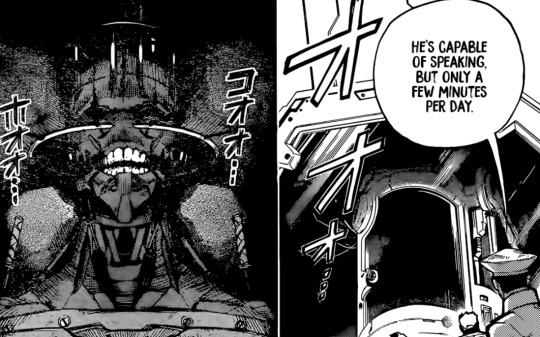
Toya's agency and choices are all taken from him, presumably to serve the plot purpose of making Enji save him to finish off his arc, and then ENJI DOESN'T EVEN SAVE HIM.
Also I think it's important to mention, Bruce's tragic ending is brought about by him attempting to save both, trying to save the joker and Jason with the same action. Whereas Enji's tragic ending is brought about by Enji NOT LIFTING A FUCKING FINGER TO HELP. Yet, it's Dabi who has the lion's share of suffering, and is sentenced to this horrific state of being skinless in an iron coffin and only being able to be awake a few minutes a day with no choice but to waste away.
Bruce is also immediately called out for his actions, by the Joker of all people, you handled this all wrong, it's your fault. Bruce is right to not kill the joker, killing the Joker would not have solved any of Jason's problems, but the fact that he put off facing Jason for so long, and his inability to communicate that he loves Jason is what leads to Jason thinking that the only way to prove Bruce loves him is to force him to choose. It's because Bruce has utterly failed to show him in any other way that he is loved.
Joker: Oh my god, I love it! You manage to find a way to win, and everyone still loses. I'm going to be the one who gets what he wants tonight, badda bing, badda boom."
I'd also like to add that a lot of agency in Enji's actions are taken away too, to make him look more blameless. It's not Enji's fault that he didn't say anything to Dabi during Dabi's dance, he passed out because he had a punctured lung. It's not Enji's fault that he spent a month protecting Deku instead of searching for Toya, he had to protect innocent people. It's not Enji's fault that he didn't go immediately to face Toya in the final war arc Hawks told him not to.
It's not Enji's fault that he made Shoto and Toya fight like Pokemon instead of cleaning up his own mess, and also he feels really sorry for it and as soon as he's done punching the bad guy he'll look after Toya he promises.
Enji does get called out for this behavior but it falls flat because it only comes from the villain AFO, and Toya himself. As I stated above too, the ending is more influenced by Enji's actions not Toya's (because Toya's agency is stripped away until he's mindless) but Toya is the one who has to die while Enji gets to live and atone.
That is the real sticking point for The Hellish Todoroki Family, the way it ends.
Themes Are For Eight Graders
The underlying problem with the whole arc and why The Hellish Todoroki Family fails as a tragedy, is because it wasn't written to be a tragedy.
The above quote is from an interview with the writers of the widely hated Game of Thrones Season 8, which took a sudden tragic turn for Dany's character, gave her an incredibly dehumanizing ending of being put down like a rabid dog by her own lover, an ending that was neither foreshadowed nor did it match with anything written before.
In this meta here by @hamliet it goes far more into depth that Game of Thrones isn't a tragedy, but a piece of Romantic fiction (not a love story, Romanticism is a genre of big emotions, the beauty of life, larger than life ideas hence why it fits well with fantasy genre, it can be sad but it doesn't follow tragic structure).
Dany is a romantic heroine, a deconstruction of the idea of the classic warrior princess trope, and you know a colonizer, but she's not meant to be written as an inherently bad person. There are people who say that Dany was going to die in the original books. I'm one of those people. Me. However, context and framing matters, Dany for all her colonizing ways does genuinely want to do the right thing, so it's likely she'd die a heroic death as a reflection of her selfless intentions (and intentions do matter for fictional characters) whereas in the show she's put down as a villain.
Now watch me I'm going to coin a term for future literary critics to use: Narrative Gaslighting.
Narrative gaslighting is different then Show Don't Tell, where an author has just failed to properly show what they're trying to tell you in the story. Narrative Gaslighting is when a narrative deliberately tries to mislead you, straight up lies to you, or just insists things that did not happen totally happened guys. Much like real gaslighting, Narrative Gaslighting makes you feel stupid for interpreting things a certain way and insists you were wrong all along.
Narrative gaslighting is when Tyrian gives a speech that everyone should have suspected Dany when she burned slavers alive that she was secretly evil and would one day turn on them.
Like, no.
Dany is flawed because she is a foreigner, interfering with the politics of a different country that she does not understand in order to gain enough resources and men to return to her home country and invade that country to exercise her right as a Targeryn to uphold the divine right of kings.
Game of Thrones doesn't mention any of that shit that's in alignment with the previous actions in the story, it's just insisting the very ableist notion that Dany was insane all along and her violence towards other people is the result of her mental illness.
(Also before anyone says, so if she's a colonizer than how can she have good intentions, everyone is Bad in Game of Thrones, they're all waging war to vie for a throne, monarchy is bad guys. IDK how to tell you that Game of Thrones has gray on gray on gray on gray morality).
(Also this aside ties into the hangup of MHA and most popular fandom culture on Twitter, that Dany's moral failings somehow disqualify her from her humanity. In spite of the fact that on top of all of that she's a rape victim, and like, Dany's only on that continent in the first place because she was sold as a bride.)
But here's the same weird subtext that Horikoshi's writing of Dabi. The fact that Dabi was continually victimized and denied human dignity does not need to be addressed, because he did the bad things and didn't atone properly enough for it first.
In essence this random post on the gunnerkrigg court forums I found on the same day the chapter came out, displaying apollo's gift of prophecy.
"When someone is persecuted, it's important to inform everyone about their flaws. That way you don't have to feel anything about all the times that they were denied human dignity."
So, Dany is not written as a tragic hero but a romantic one, we as an audience are both meant to acknowledge her flaws and sympathize with her, not demonize her in an ableist way for being insane, and even if Dany is meant to die the tragic way she dies does not match up with all of the narrative foreshadowing that was built before that.
Like, for instance a lot of POC after the show ended kept telling everyone that Dany's actions in a foreign country were seriously problematic, and not only did the audience not listen but the showwiters didn't acknowledge it with the same subtlety as the books. So those people especially were able to pick up Dany's character flaws, and when the show finally acknowledged them it's not even in the way that critiques of the show were pointing out Dany's flaws it was just "she was insane all along." Not like taking time to go "no matter what the intention, interfering with the politics of a foreign country is wrong."
The problem with the Todoroki arc is essentially the same, down to the ableism (because outsiders continually call Dabi either a maniac or insane Demon without even giving credence to his grievances about hero society he's just reduced to an insane fringe element of society, and Dabi himself is reduced to a completely mindless, childish, insane screaming state where he can't make active decisions).
The Todoroki Arc is not set up to us as a tragic one. The ending is pretty clearly telegraphed to the whole audience. People are not wrong for thinking that Toya's ending would be either rehabilitation like Rei with the eventual hope of being welcomed home, or some kind of house arrest where he still gets to be with his family.
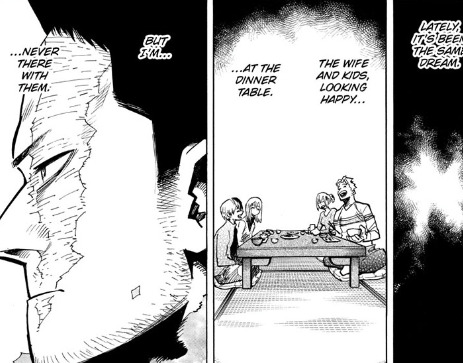
Everyone happy at the Dinner table and Enji not sitting with them.
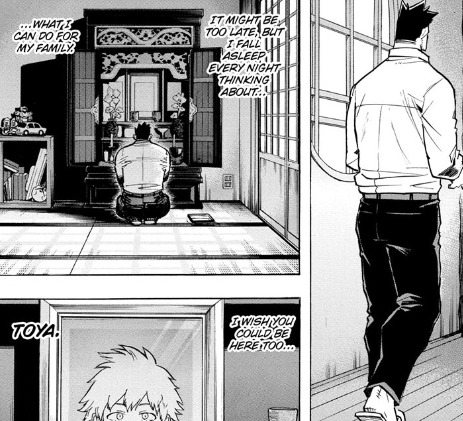
"I wish you could be here, Toya."
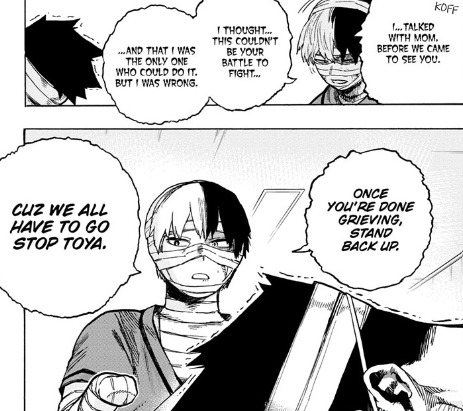
"We all have to go stop, Toya."
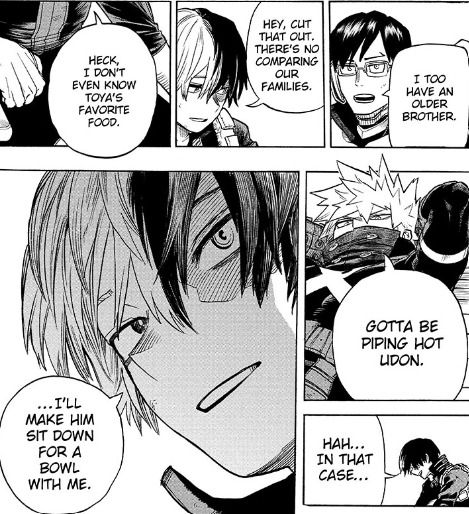
"In that case, I'll make him sit down for a bowl with me."
Even Shoto's efforts to take down Toya non-lethally are rendered completely pointless, because Toya gets back up again and then burns himself alive (completely by his own choice so no one has to feel bad that they failed).
The story sets up the expectation that Toya is going to be brought home and sit down for a meal with his family. Then it makes you feel stupid for going in an entirely different direction. It was always going to end this way didn't you know The Todorokis are a tragedy?
Well, I just spent a very long section of this thesis statement illustrating that if it's supposed to be a tragedy, then it's still not written well.
It's a written as a romantic story of a family healing, and the villain getting saved, only for the villain not to be saved and the story to just keep on going like not getting saved isn't a huge failure. This is something that should permanently destroy the main characters, that they got the chance to repeat Sekoto peak and be there this time and they all utterly failed. I feel bad for Shoto most of all because he did everything right, and he still loses his brother, but does the story show that?
The problem is the story is blatantly lying to you about the fact that Toya was somehow saved, even though he LITERALLY LOOKS LIKE HELLRAISER. To quote Codenamesanzanka again:
But I feel the story couldn't give us that because it will remind the reader and everyone just how much Touya will be missing. In-story, talking any more will overburden Touya's heart - and how apt is that metaphor? So let's talk about how we'll talk, but that's all that's allowed here for this scene. Else we'll see how unfair it is that Touya has to be confined to this room, he isn't with his family and they have to come to this prison just to tell him about their day, and soon he will be gone. Details make it real, and it would've exposed the lie that Touya was saved in an actual way. The story knows it too - "this extra time Shouto gave us." This is all 'extra', and not the core. [...] If the story was sincere that this is a case of "it's simply too late" - as it should be!!! imo, to really drive in the clear point that they failed, they did not get the save they wanted, because that's the truth - the tone of the chapter isn't tragic enough for that. The tone is going for 'Making Peace With This'. We've skipped the stages of grief and all we have is acceptance. The characters have accepted this, and so must the readers as well.
Therefore it's narrative gaslighting, the story is making us doubt our perceptions and trying instead to manipulate us to feel a certain way. We don't have to question the unfairness of Toya's fate, because look at all the people he's hurt, and look how Enji is atoning and taking responsibility.
The story builds up the idea that Enji will choose Toya. That he will choose being a father over being a hero. Enji doesn't do that, and it's Toya who suffers the horrific, painful consequences while Enji gets off mostly scott free. Mind you it's also ableist to suggest that being in a wheelchair is some sort of life-ending consequence like he's fine. The story even goes out of its way to say how avoidable this ending could have been if Enji or Rei or someone lifted a single finger to give Toya the acknowledgement he wanted, and then gives it a "Too little, Too Late" conclusion but doesn't acknowledge that this is where it's ending and instead tells us that Enji has successfully atoned.
"Everyone's watching me. So this is what it's like. If it was such a simple thing, then why not sooner?"
If it was going to turn out this way Toya should have just died here, not because death would somehow be a mercy compared to life in prison, but because the Todoroki Family doesn't deserve to get to pat themselves on the back. If they let Sekoto Peak happen a second time, then they should have to deal with the consequences of that.
It would be consistent is my point. This is written as a "Too Little, Too Late" kind of ending, but we don't get the emotional response from the Todorokis that they've let Toya die a second time.
On the other hand, UTRH has the exact same tragic ending but it doesn't make me angry because it's honest about it. The Todorokis let Sekoto peak happen a second time. Batman let Death in the Family happen a second time, but look at how even the narration and comic panels of the story acknowledge it.
"Fate is a funny thing. It swells up like a raging current and we are forced to travel. It provides us no exit. No deviation. It drops us in a bottomless ocean and compels us. We either swim, or drown, and sometimes as we struggle against the tide, a great truth arises."
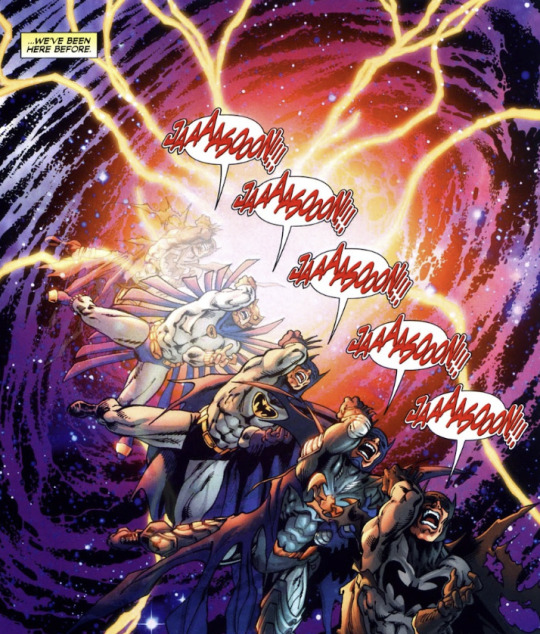
One ends with Enji meaninglessly stating that he'll spend the rest of his life atoning for Toya and watching over him (which I guess will be like two months tops) for the fifth time. The other ends with Batman being lectured by the Joker of all people of how he chose wrong and being forced to watch once again as a warehouse blows up, and he's completely helpless to save Jason.
UTRH ends with the message that Batman sucks, Enji's atonement arc ends with Natsuo calling him cool for atoning and UTRH makes me like Batman way more as a character. Whereas at this point I feel nothing from the Todoroki Family, except for a disgust for the way that Toya not only has to die, but has to die a slow, gruesome death while the rest of his family walks away with the small comfort of "oh at least we'll get to say what we need to say before Toya passes."
Especially with the fact that Toya's greatest fear was that when he died, he died meaninglessly because his family never grieved him and all moved on with their life. I guess we don't have to analyze how gross the underlying message that criminals don't deserve to be sympathized with because themes are for eighth graders.
EPILOGUE
The post is finished but apparently everyone expects me to cover every single possible angle even in posts this long.
You didn't address the cultural aspect. Under the Red Hood is a western story, and Todoroki Family is based on eastern concepts.
The post isn't about that. The post is long enough I can't cover every single topic. Here's someone who covered that topic thoroughly. This one discusses more about the nuances of collectivism.
Also, since the Todoroki Family obviously copied Under the Red Hood's homework, it warrants a comparison. Especially since it seems to critically misunderstand what made the original work.
Which is a valid form of Literary Criticism, as Ursula K Le Guinn once said:
It doesn’t occur to the novice that a genre is a genre because it has a field and focus of its own; its appropriate and particular tools, rules, and techniques for handling the material; its traditions; and its experienced, appreciative readers—that it is, in fact, a literature. Ignoring all this, our novice is just about to reinvent the wheel, the space ship, the space alien, and the mad scientist, with cries of innocent wonder. The cries will not be echoed by the readers. Readers familiar with that genre have met the space ship, the alien, and the mad scientist before. They know more about them than the writer does.
The Todorkis aren't all to blame for Toya. Natsu, Fuyumi and Shoto are innocent:
You're right. It's just easier to refer them as the Todorokis then specifying "Enji and Rei" each time.
You didn't mention Shoto once in this post:
I have no cricism for Shoto's role in all this. In fact I think he's the best written part. I praise it here.
Shoto is a good boy, and he deserved to spend more time with his brother. The fact he won't be able to sit down and have dinner of him, is the greatest tragedy of them all.
#mha meta#mha spoilers#mha 426#mha 426 spoilers#shoto todoroki#dabi#toya todoroki#enji todoroki#under the red hood#jason todd#bruce wayne#batman#mha critical#todoroki family
556 notes
·
View notes
Text
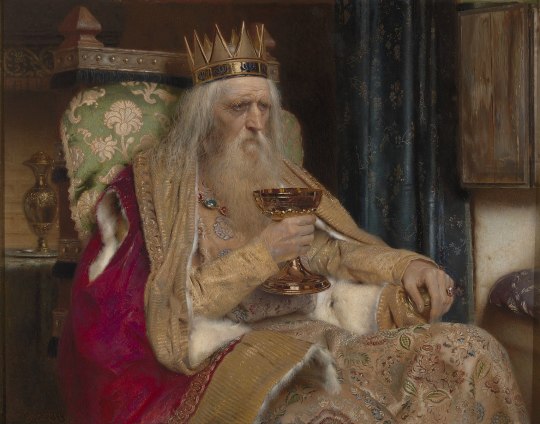
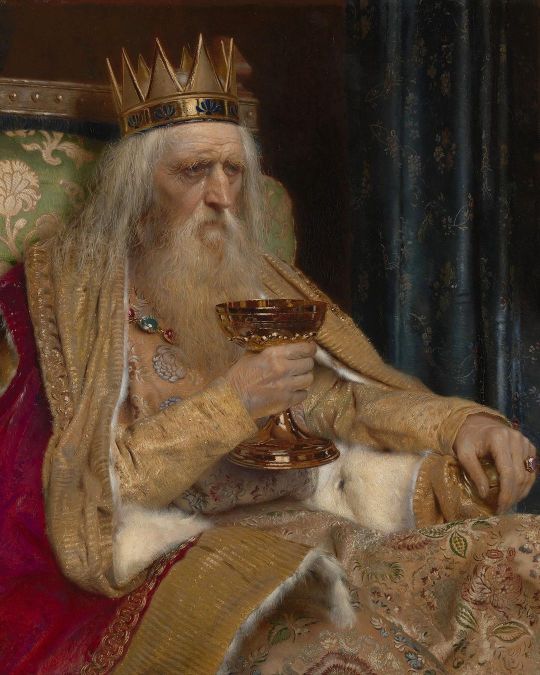
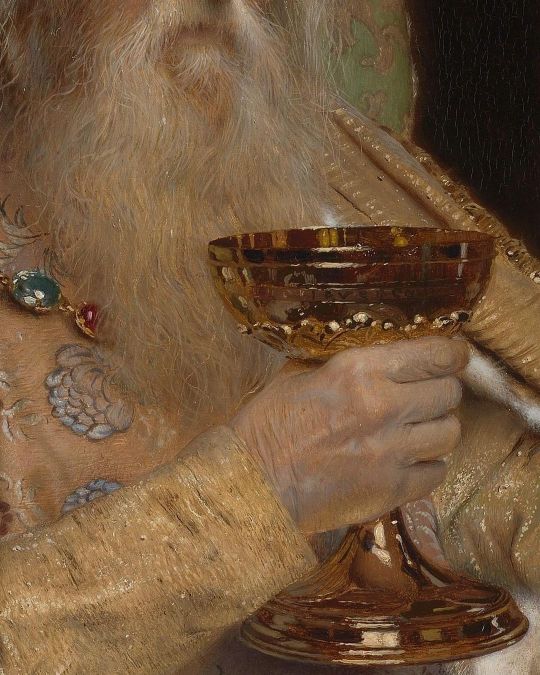
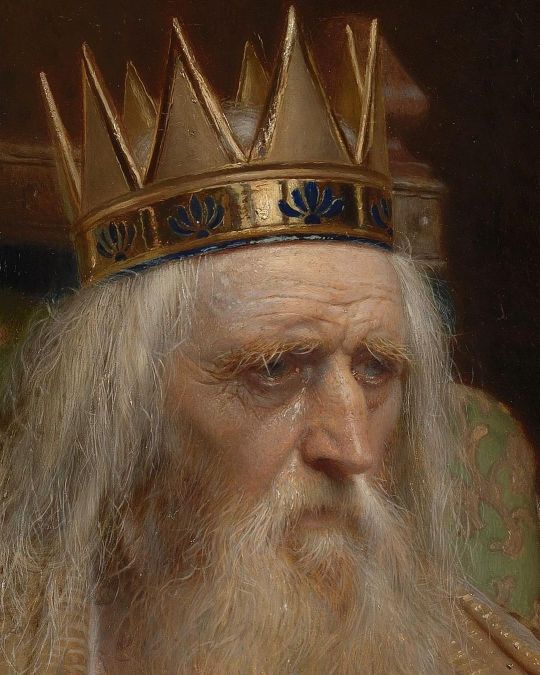
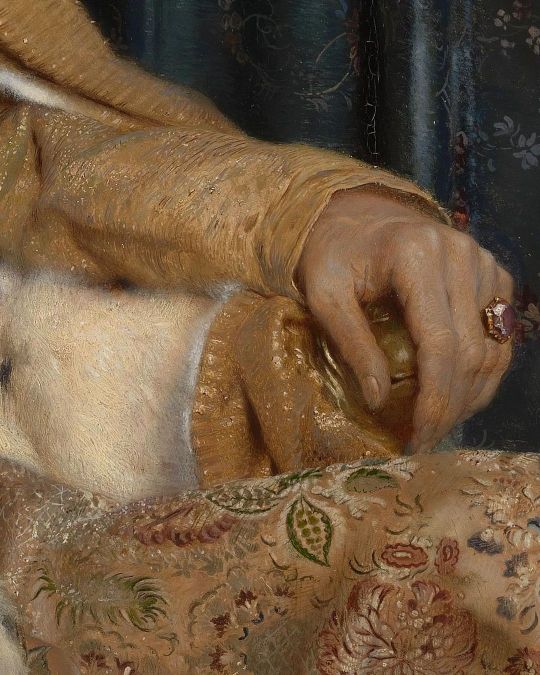
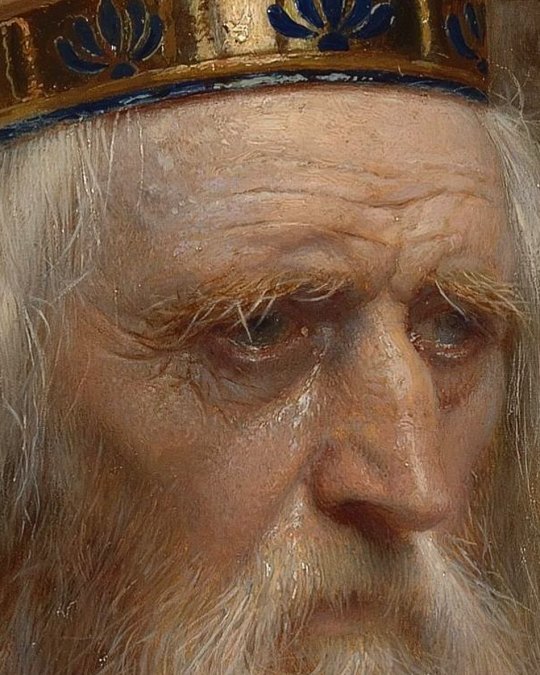
PIETER VAN DER OUDERAA - THE KING OF THULE, 1896
This portrait painting depicts the character from Johann Wolfgang von Goethe's ballad "Der König in Thule" ("The King in Thule"), portraying a king in the European kingdom of Thule who, on his deathbed, recalls his lost love and tosses a golden cup into the sea in her honor.
The old monarch is seated by a window in a spacious chair within a cramped room. A table covered with cloth is located behind the king's chair, holding a gold wine decanter on a silver platter. It is likely that the decanter has been used to fill the king's large gold goblet, which he is holding near his chest with his right hand.
The old ruler is adorned in his crown, a gold signet ring, and livery collar, along with a long, heavy silk robe decorated with flowers and a red fur cloak to shield his weak elderly body from the cold. The king wears a sombre, sorrowful expression, with tears visible on his face, lost in contemplation of distant memories.
Ouderaa was deeply moved by the emotional story, inspiring him to depict the king's somber contemplation in his art, highlighting the emotions of isolation and remorse linked to getting older and nostalgia. The work is seen as a literary masterpiece, and various composers, such as Franz Schubert, have created ballads and musical scores based on the piece.
260 notes
·
View notes
Text
How to Create Paper Cut-Out Reliefs: Tips and Techniques for Beginners
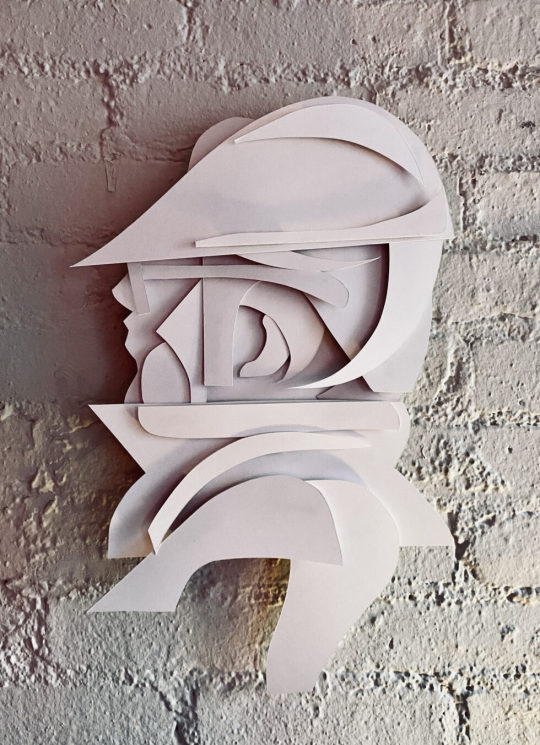
Back again with another lil' series of 2D wall relief paper cut-out forms. Both of the pieces below follow the same process and technique. Im really happy with the process and outcomes. Im working on animating them as we speak. I'll add them to this post later. My paintings inspire my drawings, and my drawings are inspired by those same forms found in my paintings. It makes sense that every so often I want to make those forms "pop out" and off the surface of a flat plane. Alas, it all starts with a quick sketch. See below, just a series of light loose free flowing lines take the lead, forward ->
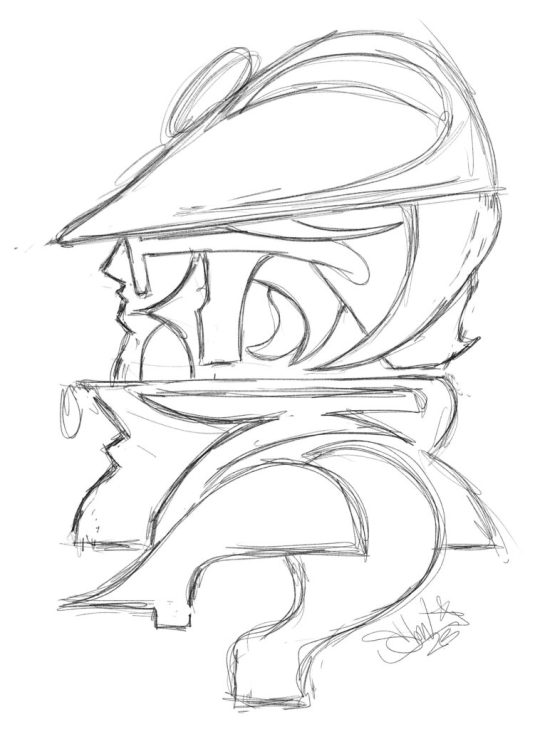
Here we have a dude posing for a profile style portrait. Most likely, this is inspired by the NYC B-Boys from the years 1983 - 87ish. Either way, it's nostalgia for me. Once the sketch feels good, I'll break out the paper and x-acto knife. I keep telling myself that one day Ill work with another material other than paper for these works, perhaps wood or metal.. It will happen, I can foresee it for sure, hang in there. Im using a white bristol paper for the cut outs, I believe it is the vellum type and not the glossy, but either or will work just fine. I love to cut paper and the whole medium of paper art in general.
Paper cut-outs, also known as paper cutting or Kirigami, is a traditional art form that involves cutting shapes and designs out of paper. The history of paper cutting can be traced back to ancient China and Japan, where it was practiced as a folk art. The Chinese and Japanese would create intricate designs, often featuring animals, plants, and mythical creatures, and use them as decorations for festivals and special occasions. I always loved it and have felt inspired by these pieces.
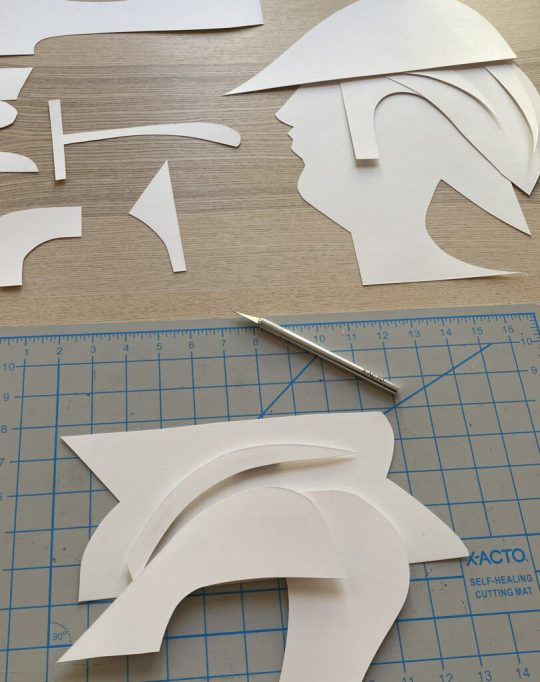
Using the sketch above, I apply the "map" of the shapes and forms that I see. Sometimes I redraw those forms on the paper that I will cut out, and sometimes I just "draw" with the x-acto knife to recreate the forms. Sometimes, it's a combination of both of those techniques. There is also a series of "out-take / byproduct" cut outs that do not make the final piece, those can be saved and used for the next piece, obviously!
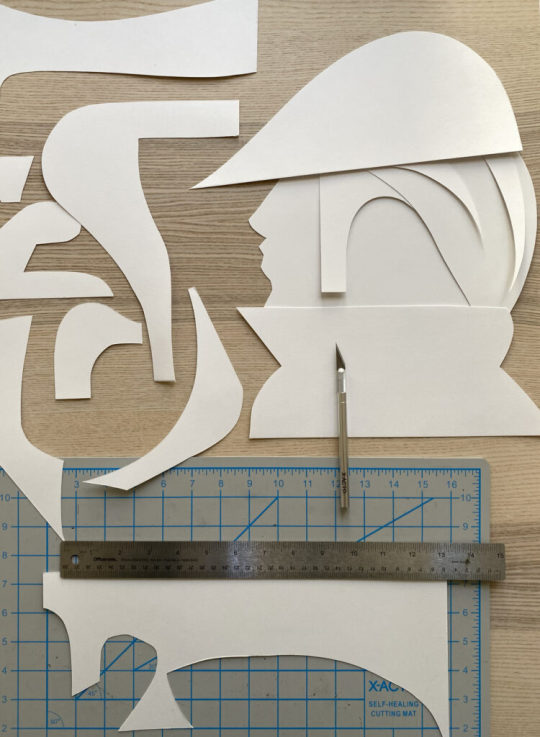
I layer the forms on top of each other to compose the arrangement as a whole, its fun to watch it all come together, in the next phase, you will need some kind of durable tape or you can make little paper forms that can be pasted to both sides of the forms as they stack, this will create the gauge and depth of the piece once it is placed onto the wall.
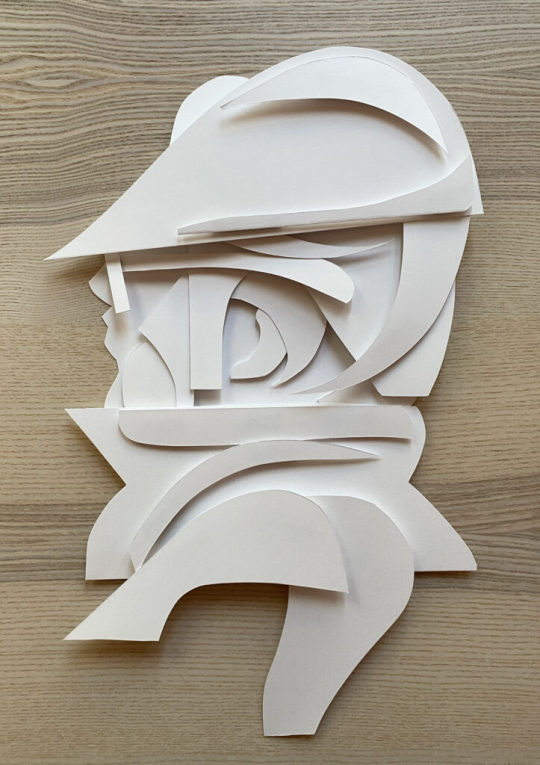
This is the final composition above, I love it! I used a roll of duct tape to make small cylinder forms that connect the pieces together, the piece as a whole comes "off of the surface of the wall" by about 1.5 - 2" inches - you can play with this a bit but keep in mind, the tape makes the piece heavier and it will want to comply with gravity :)

I hung the piece (also temporarily adhered via the same duct tape) for the photoshoot and to also get a good look at how it will function on the wall. I have an old painted fire place in my studio that is a great surface for hanging things, I love the contrast of textures between the bricks and the paper, as you know, the shadows will be super cool to see too.
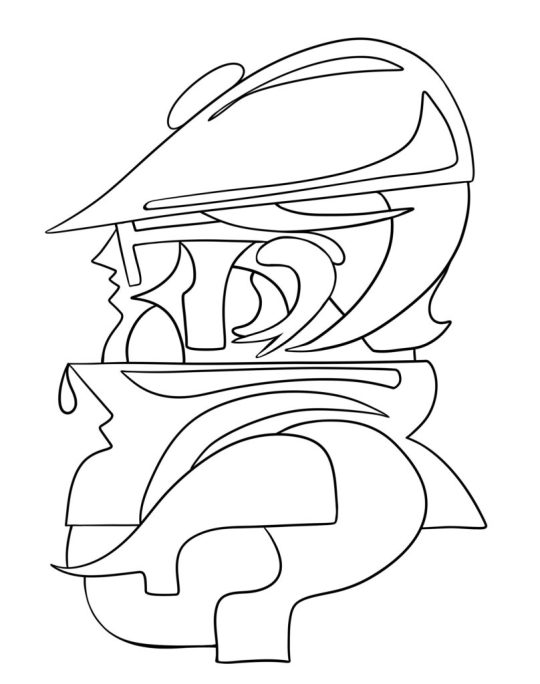
Once I had the whole piece constructed I took a few pictures of it. I immediately wanted a clean vector line drawing of the whole character. I brought the photo into adobe Fresco and used a vector brush to draw this lovely variation. This is how my brain works, I switch paths because I know they are really pipelines to the "next thing" that I will push this to, so forward we go.
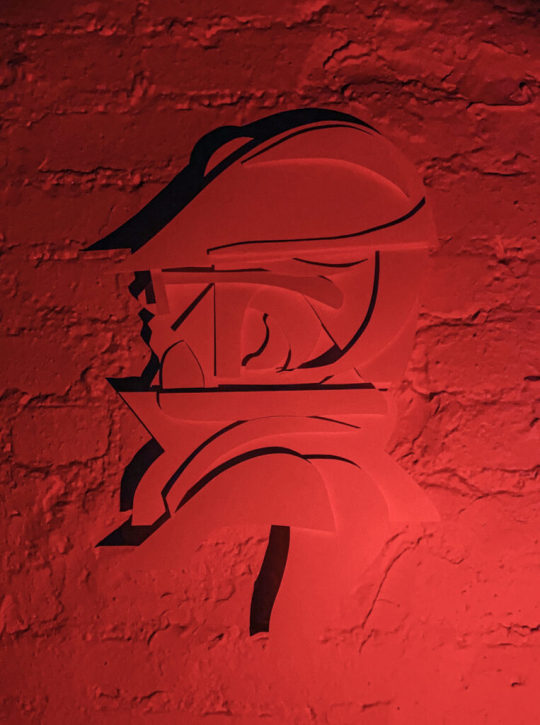
Then, it was light source and photo shoot time. Im not really happy with these picture as traditional "photographs" as I know I can do a much better job, but, as a series of "sketches" for a planned photo shoot, these will really help to make those plans a reality. I love neon colored lights. I have a bunch of them from various places and spaces that I found on the internet. Amazon has a great selection of flashlights with various colored light options. Get a few and play around with how the light can effect your work and the shadows that it creates. This is where the depth and gauge of your pieces play a role. The photos below are also a part of the same session, which all took place over a few days.
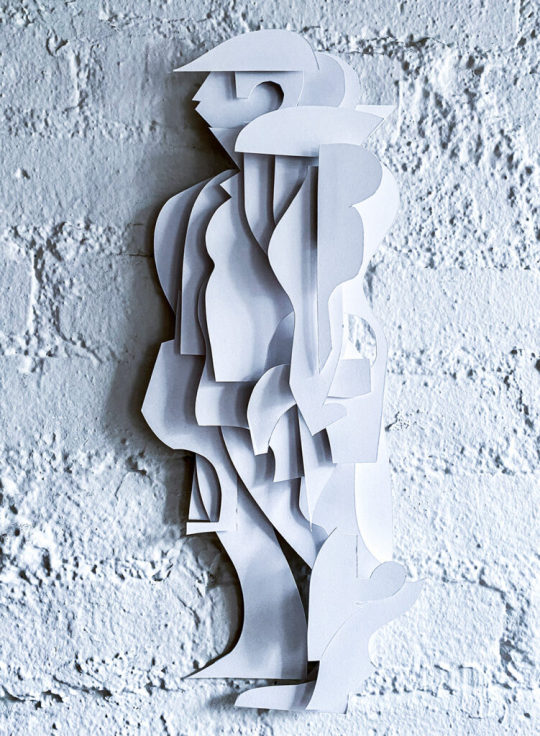
Here is another variation with a different character.. What do you think? Shall I make more?
#art#ryan seslow#ryanseslow#paper cut out#paper#paper art#2D design#2D#portrait#character design#graffiti#bboy#nyc#sculpture#paper sculpture
238 notes
·
View notes
Text
Thinking again about how John and his counterparts are just fully and completely in love with art.
The awed and breathless way he says “You’re a composer!” when Arthur tells him what he used to do. The way he lingers almost unnecessarily, lovingly, on descriptions of the things he sees, the beauty of colors and lights in the dreamlands. The way he focuses his attention on the sculptures and carvings and paintings they pass, like the woman’s portrait and the fine things in Larson’s home. His insistence on going to the cinema, to see the moving pictures humans make, another facet of their creativity. His interest in Arthur’s dreams in the pit, which are arguably the art of the unconscious mind. The way he lingers on the snippets of poetry Arthur gives to him, mulling on them and dwelling on their deeper meanings for hours and days.
Yellow does the same with Larson, from even the few fragile minutes we had with them. He takes an interest in Larson’s poetry of revenge. Yellow, who at his root is cut from the same cloth as John, even with his limited time exposed to Arthur, found some sort of appreciation for the dances performed at the Red Right Hand.
The way the cities of the King all have amphitheaters, places for plays and productions. The one in the Sleeping city, the one in the city Kayne slaughtered, there is a place for art even there. It’s so subtle but it’s there.
In Chambers’ book, the book of poetry that drives men mad is attracted to sculptors and artists and writers and in that way it is a form of love. The King is drawn to them, to the art they create, and he is fascinated in the way you would be fascinated with a mouse that suddenly stands and speaks and sings and dances. Humans are ants beneath his feet, yes, but when ants construct patterns that seem thoughtful and orchestrated, it becomes a novelty.
And novelties are fragile.
And the King is destructive by nature. He destroys them with the force his of attention, that fleeting moment of love, and their minds scatter. Lost to love and madness.
But John has no powers. He doesn’t inspire madness, he can’t destroy the art he loves in that way, and the longer he lingers with Arthur, the harder it is to remember why the thing that he was wanted to destroy it in the first place.
#malevolent#malevolent podcast#I got too metaphorical with this I’m sorry#but I have so many thoughts#art lover John Doe you are so real to me#let John Doe see a movie#please Harlan#malevolent woes#hyde chatter
205 notes
·
View notes
Text
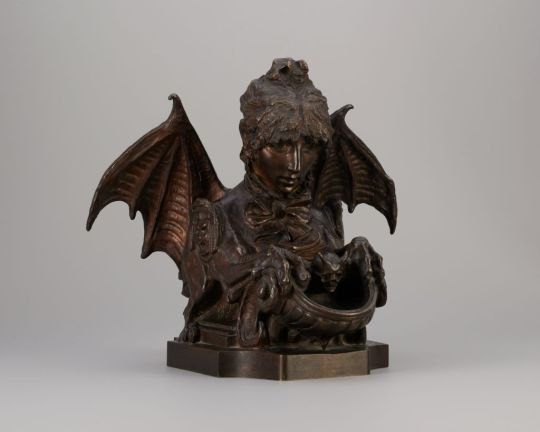
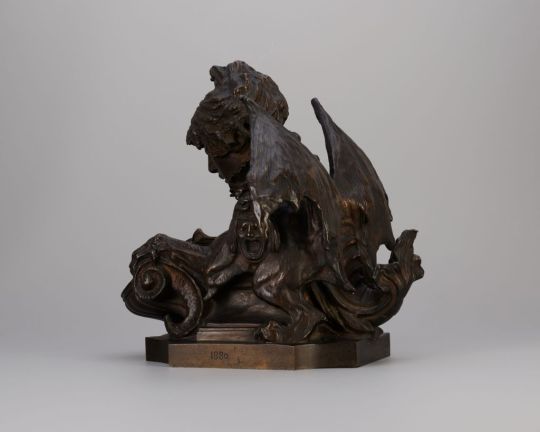

‘Self-Portrait as a Chimera’ Inkwell by Sarah Bernhardt. Made in Paris, ca. 1880, medium is bronze. Art Institute Chicago reference number: 2021.2
“French actor and artist Sarah Bernhardt was perhaps the first global superstar, with legions of admirers spread across Britain, continental Europe, North and South America, and as far afield as Australia. In this fantastical bronze inkwell, she portrayed herself as a chimera, a mythological creature composed of disparate body parts. Here, Bernhardt joined her human torso and head to clawed haunches, bat wings, and a dragon-like tail. The work is a key example of her inspired use of visual media to fashion and promote her own image.”
(Source: artic.edu)
#sculpture#inkwell#inkstand#vessels#containers#19th century#late 1800s#sarah bernhardt#french design#human figures#animal figures#chimera#bronze#brown
188 notes
·
View notes
Text
Rewind the Tape —Episode 1
Art of the episode
During our rewatch, we took note of the art shown and mentioned in the pilot, and we wanted to share. Did we miss any? Do you have any thoughts about how these references could be interpreted? How do you think Armand and Louis go about picking the art for their penthouse in Dubai?

The Fall of the Rebel Angels
Peter Bruegel the Elder, 1562
This painting is featured in the Interview with the Vampire book, and it was important enough to be included in the draft pilot script!

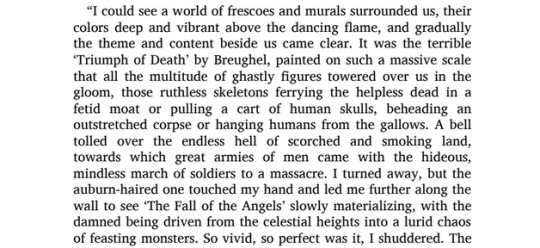
Bruegel the Elder was among the most significant Dutch and Flemish Renaissance artists. He was a painter and print-maker, known for his landscapes and peasant scenes.

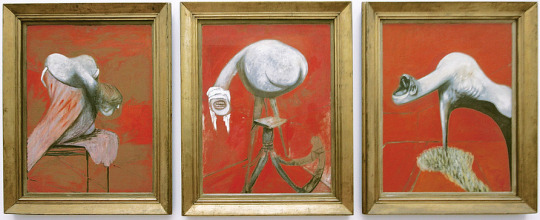
Three Studies for Figures at the Base of a Crucifixion
Francis Bacon, 1944
Bacon was an Irish figurative painter, known for his raw, unsettling imagery and a number of triptychs and diptychs among his work. At a time when being gay was a criminal offense, Bacon was open about his sexuality, and was cast out by his family at 16 for this reason. He destroyed many of his early works, but about 590 still survive. The Tate, where these paintings are displayed, says this about the work: "Francis Bacon titled this work after the figures often featured in Christian paintings witnessing the death of Jesus. But he said the creatures represented the avenging Furies from Greek mythology. The Furies punish those who go against the natural order. In Aeschylus’s tragedy The Eumenides, for example, they pursue a man who has murdered his mother. Bacon first exhibited this painting in April 1945, towards the end of the Second World War. For some, it reflects the horror of the war and the Holocaust in a world lacking guiding principles."
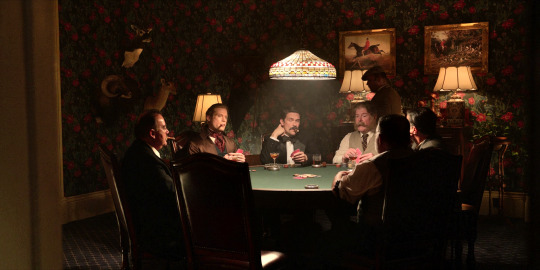
On the Hunt or Captain Percy Williams On A Favorite Irish Hunter and Calling the Hounds Out of Cover
Samuel Sidney, 1881 [Identified by @vfevermillion.] and Heywood Hardy, 1906 [Identified by @destinationdartboard.]
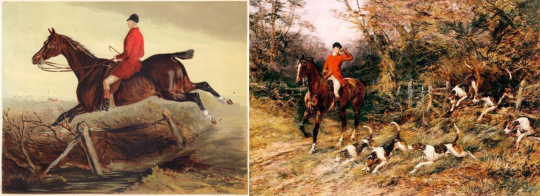
Sidney was an English writer, and his prints usually accompanied his publications about hunting, agriculture, and about settling Australia during the colonial period. Hardy, also British, was a painter, in particular an animal painter. There's also a taxidermy deer, ram, and piebald deer on the wall.
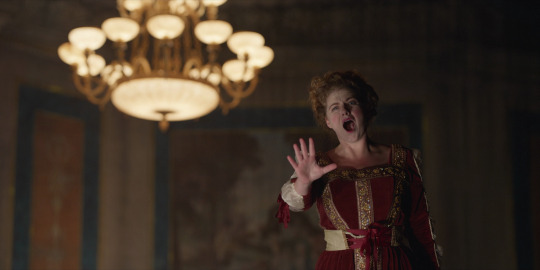
Iolanta
Pyotr Tchaikovsky, 1892
The opera Louis and Lestat go to was composed by Tchaikovsky, another gay artist. The play tells a story "in which love prevails, light shines for all, lies are no longer necessary and no one must fear punishment," as put by Susanne Stähr for the Berliner Philharmoniker.

Strawberries and Cream
Raphaelle Peale, 1816 [Identified by @diasdelfuego.]
Peale is considered to have been the first professional American painter of still-life.

Outfits inspired by J.C. Leyendecker
Leyendecker was one of the most prominent and commercially successful freelance artists in the U.S. He studied in France, and was a pioneer of the Art Deco illustration. Leyendecker's model, Charles Beach, was also his lover of five decades. You can read costume designer Carol Cutshall's thoughts on these outfits on her Instagram.

The Artist's Sister, Melanie
Egon Schiele, 1908 [Identified by @dwreader.]
Schiele was an Austrian expressionist painter and protege of Gustav Klimt. Many of his portraits (self portraits and of others) were described as grotesque and disturbing.
A Stag at Sharkey's
George Wesley Bellows, 1909 [Identified by @vfevermillion.]
Bellows was an American realist painter, known for his bold depictions of urban life in New York City.

Mildred-O Hat
Robert Henri, undated (likely 1890s) [Identified by @nicodelenfent, here.]
Henri was an American painter who studied in Paris, where he learned from the Impressionists and determined to lead an even more dramatic revolt against American academic art.
Starry night
Edvard Munch, 1893 [Identified by @vfevermillion.]
Munch was a Norwegian painter, one of the best known figures of late 19th-century Symbolism and a great influence in German Expressionism in the early 20th century. His work dealt with psychological themes, and he personally struggled with mental illness.
If you spot or put a name to any other references, let us know if you'd like us to add them with credit to the post!
Starting tonight, we will be rewatching and discussing Episode 2, ...After the Phantoms of Your Former Self. We hope to see you there!
And, if you're just getting caught up, learn all about our group rewatch here ►
#louis de pointe du lac#daniel molloy#lestat de lioncourt#vampterview#interview with the vampire#iwtv#amc interview with the vampire#interview with the vampire amc#amc iwtv#iwtv amc#IWTVfanevents#rewind the tape#in throes of increasing wonder#analysis and meta#art of the episode
95 notes
·
View notes
Text
Cultural Fashion: Earth King Kuei Pt. 1 - Head & Shoulders
The “Cultural Fashion” posts that no one asked for! ^_^
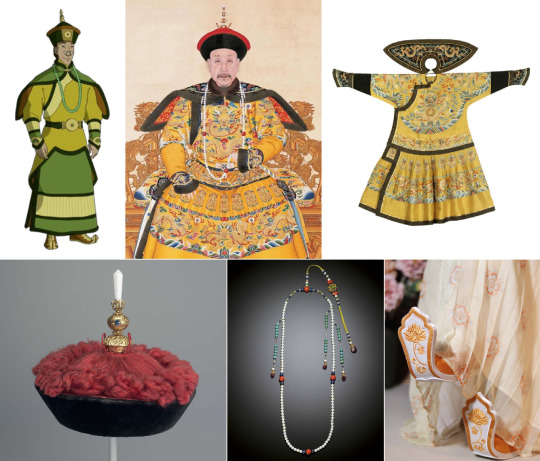
The Earth King’s design is inspired by the dress of Qing Dynasty emperors (1636–1912) in their royal portraits. Starting from the top: The hat worn is called a cháoguān (朝冠) in Mandarin, meaning “court hat”, and a mahala (ᠮᠠᡥᠠᠯᠠ ) in Manchu, meaning “morning crown”. This hat was only allowed to be worn by Qing emperors and members of the imperial family. The chaoguan came in two styles: one for cold weather (what the Earth King wears) and one for warm weather (pictured here).
Moving on to the neck, the little collar-cape is called a pī lǐng (披领), meaning “detachable collar”. This collar was worn by members of the imperial family, nobility, and court officials for formal occasions. The necklace is called a cháozhū (朝珠), meaning “court beads”. Traditionally, chaozhu were only allowed to be worn by Qing dynasty emperors, members of the imperial family, 1st through 5th rank imperial civil officials, and military officials above the 4th rank. The chaozhu of an emperor was typically composed of multiple valuable materials such as pearl, coral, amber, jade, and other precious stones. For animation purposes, the Earth King’s simplified chaozhu is composed exclusively of jade beads.
Fun Fact: Chaozhu were actually inspired by Tibetan prayer beads! However, they lost their religious connotation once they became adopted as court dress.
In Part 2, we’ll cover Earth King Kuei’s clothing and shoes.
Like what I’m doing? Tips always appreciated, never expected. ^_^
https://ko-fi.com/atlaculture
242 notes
·
View notes
Note
Ur urbanspook headcannons? brava. Spectacular give me 15 more of these
Your wish is my command anon🫀🫀🫀
🦷 Mona’s favorite holiday, predictably enough is Halloween and she loves the autumn season in general. Bill meanwhile, as a stark contrast, REALLY gets into Christmas.
🦷 Mona is touch starved and she doesn’t know it. She completely melts when Bill runs his fingers through her hair or touches her for any reason but she tries to hide these reactions since she doesn‘t want to come off as “weak”.
🦷 Nathan Cole was Bill’s partner and the more level-headed of the duo, being the one who had to reel Bill in whenever he got “overzealous” during police work. Nathan’s a legit good cop and generally nice guy while Bill was an asshole who was the epitome of police brutality.
🦷 The Gimp seen in HELL was Mark, as in “Mark The Machine” who was a blogger/YouTube personality who covered real crime and serial killers and was documenting Mona and Bill’s murders for years, which piqued Mona’s interest in him as she believed he genuinely appreciated her “art”, resulting in her stalking him for a while until finally kidnapping him and turning him into a pet, which is the full extent of her showing any actual affection towards someone. The title of Mark’s “portrait” is a reference to his background as an Internet personality and how Mona has managed to break him down to essentially just a machine, a toy for her to use as she pleases.
🦷 As mentioned before, Mona has an extreme allergy towards sunlight and photosensitivity that makes direct contact with sunlight very painful for her. As a result, Mona only goes out late at night or very early in the morning when the sun isn’t up. On cloudy days she’ll wear a “disguise” composed of a sun dress, opera gloves, stockings, a sun hat, a tattered parasol and a pair of sunglasses, allowing her to comfortably be outside during the day while also protecting herself from any potential rays that may be peaking out.
🦷 Mona is double jointed and is extremely flexible as a result. Her flexibility and ability to contort herself comes in handy in her murders as she is an expert in hiding and breaking in and out of places and she can squeeze herself into tight spaces quite easily as well. This talent of her’s comes in handy on nights when she and Bill get naughty 😏
🦷 Mona does not care for personal hygiene, she likes being a decrepit, stinky girl. However, if there is one form of self care she actually likes it’s brushing her hair because she finds it soothing and she likes her hair in general. Bill is tasked with brushing her hair and has a tendency to smell it while he does.
🦷 Mona has a bit of a hoarding problem as she is an avid collector of many things ranging from knives and human bones/skulls to dolls/stuffed animals and many of her hideouts boasts some impressive collections she has amassed over the years.
🦷 Mona also has an interest in entomology and mycology and boasts some fairly impressive knowledge on the subjects as a result. She’s got some nice bug and mushroom collections as well but she keeps them hidden because Bill keeps trying to eat them.
🦷 Bill loves coffee while Mona is more of a tea gal. Bill prefers iced coffee over hot and Mona prefers hot tea over iced. Also, Mona can take or leave coffee, Bill meanwhile HATES tea.
🦷 Bill loved breakfast foods, eggs & bacon, pancakes, waffles, donuts, you name it, he was also a fan of eggs in general and isn’t too keen on sweets most of the time. Mona is a MEAT girl, any kind of meat will do but human meat/organs is her favorite.
🦷 Mona dislikes guns because she finds them to be an incredibly boring and “impersonal” way of killing someone that doesn’t inspire her much, preferring a more “hands on” approach to murder. Bill meanwhile doesn’t just like guns, he practically worshipped them and was a typical second amendment, NRA type before meeting Mona.
🦷 Mona’s favorite genres of music are Industrial, Alternative Rock, Grunge, Horror Punk, Goth Rock and Dark Cabaret, her favorite artist is either Voltaire or Tom Waits. Bill’s favorite genres are Hard Rock, Thrash Metal, Death Metal, Nu Metal, Groove Metal and Psychedelic, his favorite artist is either Rob Zombie or Disturbed.
🦷 By far, the worst thing Mona has ever done was when she blew up a daycare on Christmas Eve, collected the charred remains of the infants, stitched them back together as macabre flesh dolls and sent them to their parents in gift boxes on Christmas day. Even Bill was kinda shocked when she did this and genuinely didn’t think she could get anymore depraved until she did it… which only made him love her even more in the end.
🦷 Mona’s choice for a final meal would be brown sugar glazed pork chops with colcannon and roasted asparagus, filet mignon with lobster tail, black pudding, a slice of spiced apple cake with french vanilla ice cream and a cup of earl grey. Also if given the choice, Mona would choose to be executed by firing squad. Bill’s final meal would be two pounds of fried chicken with a pound of fried shrimp, scrambled eggs, roasted potatoes, a pound of strawberries and a bottle of fireball whiskey. Bill wouldn’t care how he’s executed, just as long Mona is there to see him off.
31 notes
·
View notes
Text

Heroes & Villains The DC Animated Universe - Paper Cut-Out Portraits and Profiles
The 31st century superhero called Brainiac 5 was the fifth generation ancestor of the Kryptonian entity known as Brainiac. At some point in the past, the artificial intelligence had determined a means of passing down its code on a genetic level: thus creating organic descendants. While young Brainiac 5 shared his ancestor's genius, he rejected the malevolence that made the original Brainiac a frightful scourge unto the cosmos. To the contrary, Brainiac 5 joined the Legion of Superheroes as a means of making amends for the misdeeds of his great, great grandfather.
This Legion was composed of young super-powered heroes from all over the United Planets who took inspiration from Superman and the Justice League to fight for truth and justice. Brainiac 5’s tremendous ‘12th-level’ intellect was a great boon to the Legion and he went on to become a most valued member of the team.
When the villainous Fatal Five succeeded in defeating most of the Legion, Brainiac 5 was forced into desperate action. He used a time travel device to transport members of the 21st century Justice League to his era to aid him. These Leaguers included Green Lantern, Green Arrow and Supergirl.
The gambit paid off and the heroes were able to take down the Fatal Five and rescue the captured Legionnaires. Partially due to her comfort with the Legion's era of advanced technology, and partially due to a mutual attraction between her and Brainiac 5, Supergirl elected to remain in the 31st century as a member of the Legion of Superheroes.
Actors Matt Czuchry and Noel Fisher each provided the voiced for Brainiac 5 with the young Legionnaire first appearing in the third episode of the third season of Superman: The Animated Series, ‘New Kids in Town.’
#Brainiac 5#Supergirl#legion of super heroes#Justice League#superman the animated series#Matt Czuchry#Noel Fisher#DCAU#cut-out#paper art
30 notes
·
View notes
Text



On August 15th 1771 Sir Walter Scott the poet and novelist was born in Edinburgh.
Walter survived polio as a toddler which left him with a limp and he used a cane the rest of his life. He was the first author to have international fame in his lifetime and is credited with inventing the historical novel.
Scott used the great storytelling tradition of the Highlands to help bring back the Scottish identity that had been cruelly crushed by the British. His Waverly novels were very popular in Europe and America starting Romanticism and influencing American writers such as Thoreau and Twain.
As well as popularising the historical novel, his books more or less invented tourism in Scotland. A family holiday to Loch Katrine inspired Scott to write the epic narrative poem The Lady of the Lake; a romantic, stirring tale of secret identity, love and loss. It was a publishing phenomenon and readers flocked to see the landscape Scott had described. Thus when travel entrepreneurs such as Thomas Cook began selling packaged railroad tours in the 1840s, Scotland was one of the most popular destinations. Victorians who had grown up on Scott’s Waverley novels, and now technology made it possible to reach these areas
Scott was a prolific writer, publishing two novels a year. Readers around the globe devoured his tales of historic Scotland and its noble, heroic people.
Composers in particular found inspiration in his work, among them Gaetano Donizetti who was inspired to write the tragic opera Lucia del Lammermoor based on Scott’s novel The Bride of Lammermoor. Franz Schubert was similarly moved, setting text from The Lady of the Lake to music to create his much-loved work Ave Maria.
When King George IIII visited Edinburgh in 1822 Scott was put in charge of the festivities. This was the first time a reigning monarch had made it north of the border in over 200 years and Scott masterminded a spectacular Scottish show in his honour.
He created a romantic - and, some argued, and still do argue, an unrealistic - vision of the Highlands on the streets of the capital with parades, gatherings of clans and swathes of tartan on display. King George himself lapped up this romantic symbolism, dressing in a kilt for the occasion and, like a 19th century influencer, prompting others to wear it too. It marked a turning point in the way the world saw Scotland, and the return of tartan to fashionable society following a ban enforced by the government in the aftermath of the Jacobite rebellion.
Scott’s influence in society allowed him to lobby on causes he held dear.Sir Walter Scott got involved in a number of political issues. Particularly, his interested in issues where the government was trying to impose things on Scotland. For example, the Bank of England wanted to withdraw the right of Scottish banks to print bank notes, it's testement to the man that he features on bank notes not just today, but going back to the days of smaller nbanks, like the Linen Bank in Scotland, The Bank of Scotland range of notes still carry his portrait. Scott He stirred up such a furore that the government backed down, so you have him to thank that your not carrying English bank notes around with you, imagine a life where we Scots couldn't have a good old moan about businesses in England refusing to take our money as payment!
Scott’s popularity as a poet was cemented in 1813 when he was given the opportunity to become Poet Laureate. However, he declined and Robert Southey accepted the position instead.
Having suffered a stroke in 1831, which resulted in apoplectic paralysis, his health continued to fail and Scott died on 21st September 1832 at Abbotsford, I hope to read and post more about Sir Walter Scott in just over a months time.
38 notes
·
View notes
Text
Image Prompts for the Signs
Aries / Taurus
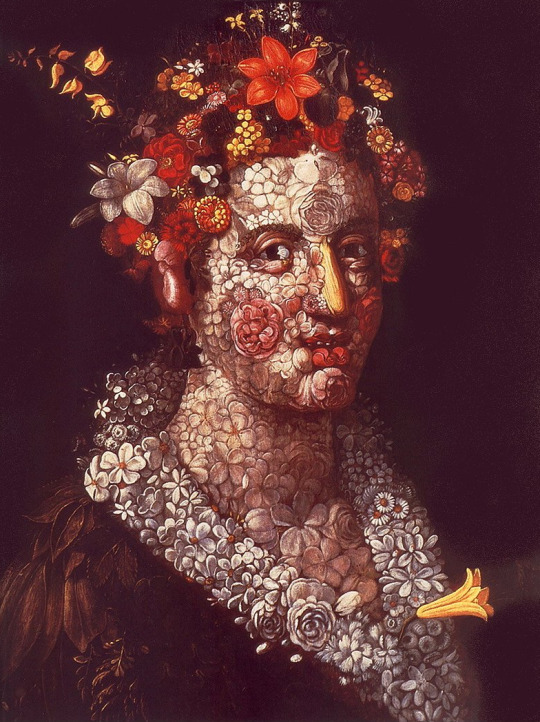
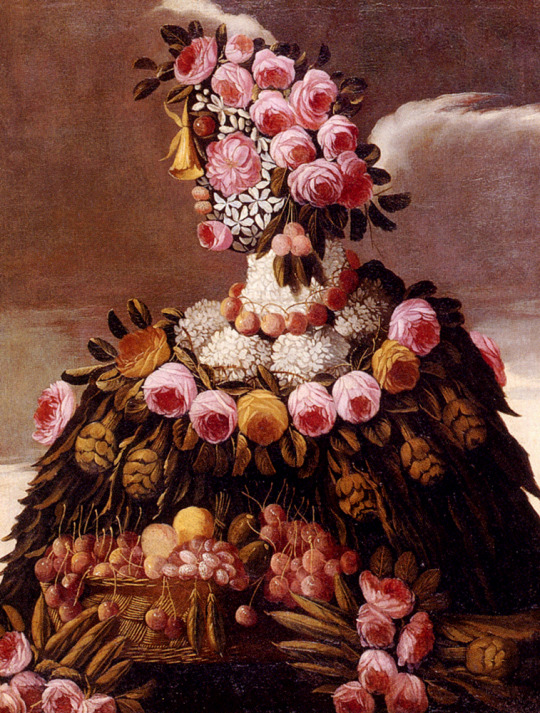
Gemini / Cancer
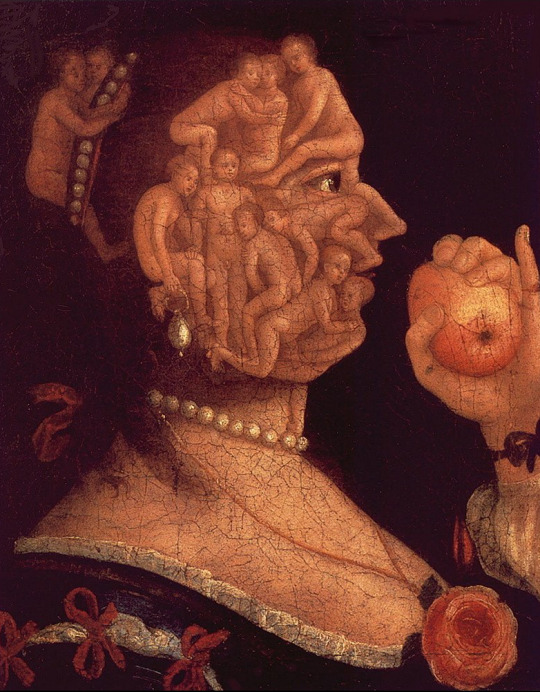

Leo / Virgo
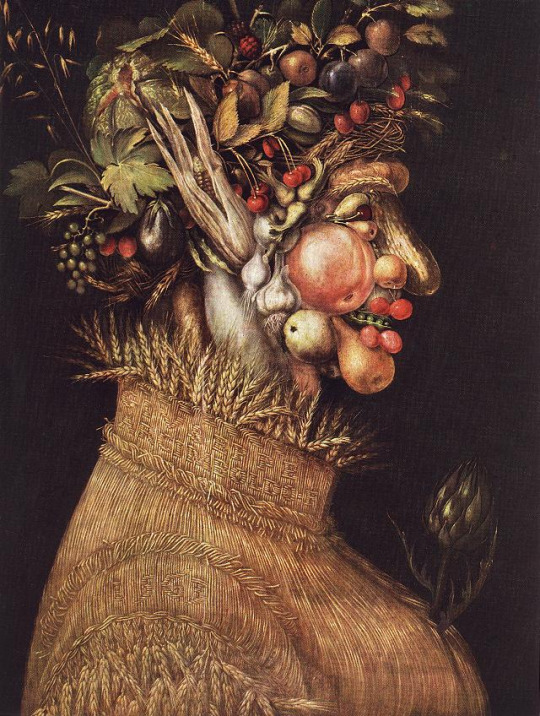

Libra / Scorpio


Sagittarius / Capricorn


Aquarius / Pisces
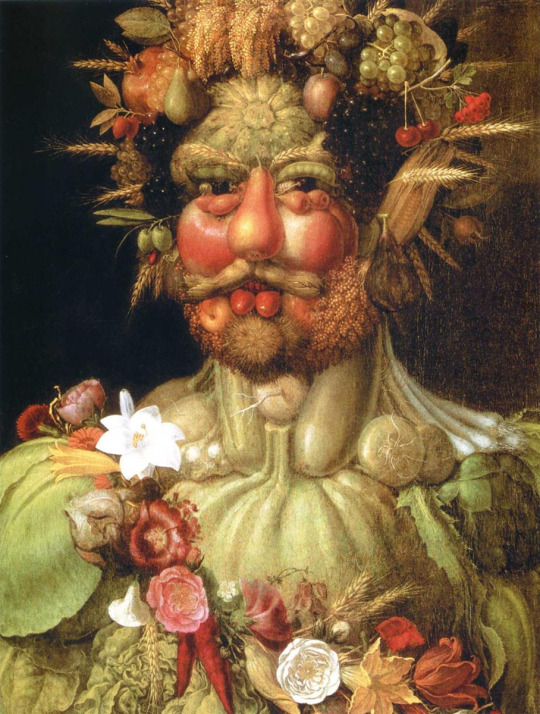

If this prompt inspires you in any way, do tag me or send me a link. I'd love to read your work!
Artwork by Giuseppe Arcimboldo
Giuseppe Arcimboldo (1526 – 1593)
Born into a family of painters in the northern Italian city of Milan.
Remains best known for the highly original “portraits” he composed by imaginatively arranging objects, plants, animals, and other elements of nature.
The Seasons
In The Seasons (Spring, Summer, Autumn, and Winter), created in 1563, Arcimboldo combined plants associated with a particular season to form a portrait of that time of year.
The series was extremely popular in the Habsburg court, and Arcimboldo reproduced it several times so the emperor could send versions to friends and important political figures.
The 4 Elements
Three years later he completed a series on the four elements (Earth, Air, Fire, and Water).
The Professions
Arcimboldo also made witty composite portraits of different professions, such as a librarian, jurist, cook, and vegetable gardener, using objects associated with each occupation.
In these innovative works, Arcimboldo fills the paintings with dense details that come together harmoniously to create a human form.
A Fusion of Art & Science
When Arcimboldo arrived at the court of Emperor Maximilian II, he found his new patron was passionately interested in the biological sciences of botany & zoology.
The study of flora and fauna grew as a result of the voyages of exploration and discovery that were undertaken to the New World, Africa, and Asia in the sixteenth century.
Explorers returned with exotic plants and animals that created an explosion of European interest in the study of nature.
Maximilian transformed his court into a center of scientific study, bringing together scientists and philosophers from all over Europe.
His botanical gardens and his zoological parks with elephants, lions, and tigers caused a sensation.
As court painter to the emperor, Arcimboldo had access to these vast collections of rare flora and fauna.
His nature studies show his skill and precision as an illustrator and his knowledge as a naturalist — but Arcimboldo went beyond illustration by building fantastic faces out of the natural specimens he observed.
His paintings not only demonstrate a unique fusion of art and science, but they also provide an encyclopedia of the plants and animals that Maximilian acquired for his botanical garden and menagerie.
#writing prompt#writeblr#spilled ink#dark academia#giuseppe arcimboldo#art#zodiac signs#star signs#horoscope#art reference#art resources#literature#writers on tumblr#poetry#poets on tumblr#lit#studyblr#creative writing#writing reference#nature#allegorical painting#writing resources
21 notes
·
View notes
Text

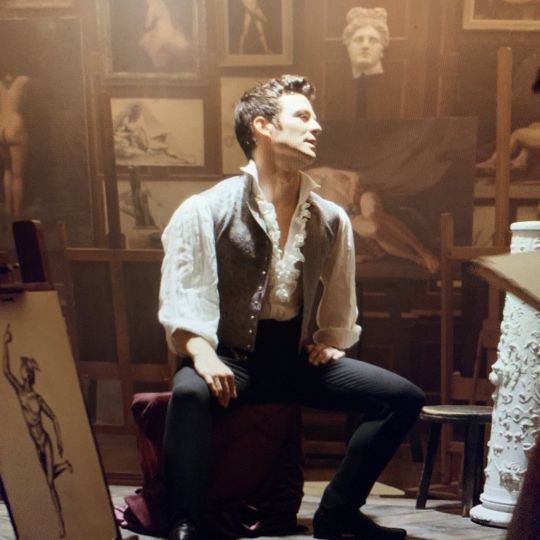


Passionate Strokes // Benedict Bridgerton
Masterlist | Join Taglist !!
↳ tags : benedict bridgerton x male reader,benedict bridgerton x reader,bxb,bridgerton.
↳ pronouns used : he/him/his
↳ word count : 3,466
↳ note : i haven't seen ANY benedict x male reader's sadly, so i decided to write one of my own :)), ALSO tysm for the likes on the other post !!
Chapter 1: The Encounter
In the bustling streets of London's labyrinthine alleys, Benedict Bridgerton found himself ensnared by a mysterious figure, emanating an aura of ethereal allure. Their paths converged on a serendipitous afternoon, and a fleeting exchange of glances set Benedict's heart ablaze, as if a thousand sonnets whispered in his veins.
Chapter 2: Hidden Desires
The vivid image of this enigmatic being refused to relinquish its hold on Benedict's thoughts. Night after starlit night, he sought solace in the sanctuary of his studio, where passion coursed through his fingertips onto the blank canvas. Each brushstroke became a dance, imbued with a fervent desire to capture the very essence of this man who had awakened the dormant chords of his soul.
Chapter 3: Painting the Unseen
Time unfolded like an unfathomable tapestry as Benedict's obsession deepened, roots burrowing into the sublime contours of the man's countenance. With an artist's discerning eye, he etched every delicate line into the alcoves of his memory, translating them onto the canvas with a palette of moonlit hues. Each brushstroke became an impassioned plea, a symphony of silent longing resonating within the unspoken spaces.
Chapter 4: A Secret Unveiled
The tapestry of fate weaved an unforeseen strand of destiny, guiding the man into Benedict's hallowed studio. In a delicate dance of chance, the man stumbled upon the myriad of portraits adorning the walls, his eyes encountering the embodiment of his own enigma. In that breathless moment, the atmosphere shimmered with electric anticipation, a wordless symphony conducted solely by the heart's percussive rhythm.
Chapter 5: Mutual Awakening
Emotions, wild and untamed, surged beneath the surface, birthing unspoken verses that yearned to be sung. Amidst the sacred silence, their souls entwined, painting a sonnet of connection that transcended the boundaries of spoken language. A shared vulnerability bound them together, their hearts united in a harmonious crescendo, where the unspoken became their mutual language.
Chapter 6: Love on Canvas
Within the ethereal haze of their burgeoning love, Benedict's art bloomed, capturing the divine essence of their intertwined existence. Each brushstroke wove a tapestry of adoration, breathing life into pigments that danced and whispered their secrets. The paintings became a melodic testimony, a love song in pigmented verse, where the depths of their passion painted the symphony of their devotion.
Chapter 7: A Masterpiece of Love
Benedict's art, like a poet's quill, flourished, immortalizing their love story in vivid strokes upon the canvas. The world, enraptured by the poignant portrayal of desire and connection, marveled at the raw intensity conveyed within each brushstroke. Yet, only Benedict and his muse knew the untold verses, the unsung stanzas, the profound love that inspired these masterpieces—a love whispered in hushed breaths and ardent embraces.
Epilogue: A Love Beyond Art
Benedict and his muse, their souls forever intertwined, ventured forth hand in hand, their love an eternal sonnet. Through the tapestry of their shared journey—passion, art, and self-discovery—they discovered solace within the other's embrace. While their paintings stood as resplendent testaments to their love, their true masterpiece would forever be the symphony they composed—a love that defied conventions, a love that kindled their spirits, forever altering the course of their lives.
#benedict bridgerton x male reader#benedict bridgerton x reader#netflix#bxb#bridgerton#male reader#pls read#i love this man sm#poetry
155 notes
·
View notes
Text

Marcelle Lender Dancing the Bolero in "Chilpéric"
Artist: Henri de Toulouse-Lautrec (French, 1864-1901)
Date: 1895-1896
Medium: OIl on Canvas
Collection: National Gallery of Art, Washington, DC, United States
Overview
Henri de Toulouse-Lautrec had a passion for the theater in all its forms, from the popular dance halls and cabarets to the avant-garde theaters of Paris. He was both a keen spectator and an active participant, designing posters, theater programs, scenery, and costumes for a number of theaters and stage productions. Although he was drawn to the spectacle of the performance, it was the performers who most fascinated him.
Among Toulouse-Lautrec's favorite subjects was the red-headed actress Marcelle Lender. He first encountered her in 1893, the year he began to attend the theater on a regular basis. His infatuation with her reached its peak two years later when she starred in the revival of the French librettist and composer Hervé's Chilpéric. Performed at the Théâtre des Variétés in Paris from February 1 to May 1, 1895, this comic operetta recounted the tale of Chilpéric, king of the Franks in the late sixth century. In a bid to consolidate his power, he allied himself with the Visigoths in Spain through a marriage to the princess Galeswinthe, even as his vengeful mistress Frédégonde plotted her murder. It was neither the melodramatic narrative nor the extravagant staging of the operetta that most appealed to Toulouse-Lautrec, however, but the actress in the role of the princess. Like all his "furias" (as the artist termed his fixations on certain performers), this one was brief but intense. During the operetta's three-month run, he attended it more than twenty times, arriving just to see Lender dance the bolero in the second act. When asked about his devotion to the play, Toulouse-Lautrec explained, "I come strictly in order to see Lender's back. Look carefully; you will seldom see anything as wonderful. Lender's back is sumptuous." He sketched and studied the actress diligently, ultimately producing six lithographs inspired by her appearance in Chilpéric (five of them of the performance itself) and two paintings, including this monumental canvas. Toulouse-Lautrec's admiration was not reciprocated. "What a horrible man!," Lender is said to have remarked. "He is very fond of me….But as for the portrait you can have it!"
One of the largest and most elaborate paintings Toulouse-Lautrec ever created, Marcelle Lender Dancing the Bolero in "Chilpéric" depicts the very scene the artist so enjoyed, in which Galeswinthe performs the bolero, a lively dance from her native Spain, for her future husband and his courtiers. She dominates the center of the composition. Dressed in a Spanish-inspired costume composed of black and bright complementary shades of red and green, her body is described in strong, sinuous lines. Toulouse-Lautrec's portrayal of the actress is both dynamic and sensual. He captures her at mid-movement, as one long leg, clad in black stockings, juts boldly outward from a swirl of pink petticoats, mimicking the silk flowers she wears in her hair in form and color. Her low-cut bodice accentuates her ample bosom, which is tinged green from the reflected glow of the footlights. All eyes are upon her as she dances, from King _Chilpéric, seated on his throne at left, to Galeswinthe's brother, Don Nervoso, who stands, arms akimbo, at the far right. Gazing at her from behind with an expression of open appreciation, it is Don Nervoso and not the viewer who is the beneficiary of the fine view of Lender's back, and as such he may be a stand-in for the artist himself.
#painting#oil on canvas#genre art#dancing#marcelle lender#bolero#henri de toulouse lautrec#french art#stage#women#men#costume#flowers#european art#french#19th century
14 notes
·
View notes
Note
Maybe one where reader - due to some recent unsuccessful business or other hardships - lost considerable amount of self confidence, hiding in her own bubble, and space cowboy tries to drag her out of the stagnating in his own bastard way? Reader could be friend or romantic interest, it'd be up to you. What do you say?

An Unlikely Muse
Cad Bane x Gen! Reader
Summary: You are an artist whose mind’s been blocked until Cad Bane comes to call.
Warnings: Nudity, implied smut, kissing, lust filled thoughts, and fluff/comfort (in Bane’s own way).
Word count: 3.5k+
Notes: @deepbluespace4 , sorry this took so long to get to. I was inspired to write this based on your ask. ;) I had you and others in mind when writing it, a sort of shoutout to Bane artists, I guess.

“What are ye down in de mouth about?” the Duros asked, his lean build held up by the doorframe of your paltry studio.
The tools of your trade were littered about the room, everything having its place in the wake of organized chaos. You sat with your back against him, toiling over a blank canvas, your mind obstructed from accessing the breadth of your normally overactive imagination. You found your creativity to be lacking, and your mood had taken a turn for the worse.
This was becoming a repeat scenario, you with your brushes and paints laid out before you, yet nothing to show for it. You jumped, startled by your lover’s voice, not bothering to wonder how it was he had found his way inside your home.
“Stop creeping up on me like that,” you warned, though you lacked conviction. The bounty hunter smirked, one corner of his mouth twitching upward as he stepped further inside the room.
“Ain’t creepin’. Was in de neighborhood.”
Cad Bane was not a man to be told what to do, yet he tolerated you for some strange reason. Oddly enough, he had commissioned you for a portrait that now hung in Maz’s castle on Takodana, or so you had heard, as you had never stepped foot on the remote planet to see for yourself.
The gungslinger had received your name based on someone’s recommendation, yet he had not bothered to elaborate. You were left guessing who had dispatched Cad Bane to your doorstep.
Regardless, the Duros had provided you with a distinguished holo of a Weequay pirate, mentioning something about his hatching day, and he had been quite satisfied with the result. Afterward, you bargained with him. Instead of credits, you solicited him for something a bit irregular, having caught him perusing your body with those stark red eyes.
What was the worst that could happen? You were sure he held an attraction for you.
At first he made it clear that he thought you were “pulling his leg,” as the saying goes, yet you were dead set on bedding the Duros if he allowed – not only was he excruciatingly attractive, but his reputation proceeded him. You wanted bragging rights, as childish as that may have seemed at the time, and it was evident the thought had already crossed his mind.
Honestly, you were shocked by your own gall, blaming it on those hypnotizing, gleaming jewels that permeated you down to your core with every glance.
“Let me get dhis straight—” he had begun, “—ye wanna fuck me in exchange fer paintin’ dhat dhere portrait.”
“Yes,” you had answered plainly, remembering the merc had cocked his brow at you.
“Fine, saves me money in de long run,” had been his only reply, though it was enough to leave you satisfied.
It was an evening you would not soon forget, etched into your memory as if your mind was composed of black-bark wood, and Bane was the chisel used to shape and mold you to his liking.
Apparently, the bounty hunter was particular with whom he spent his time with. At some point, he had decided he rather favored you (for reasons unknown), and to your surprise he often came to call. You had grown fond of his intermittent visits, and never dared turn him away, even when you were feeling disheartened and depressed; you were currently a victim of the dreaded Artist’s block.
“I’m sorry, I’m just a bit out of sorts,” you admitted, turning on your stool to face him. He was a sight to behold, not once growing tired of admiring his slender physique.
“Cahn tell dhat by lookin’,” he commented offhand, Bane not one to sugarcoat things, even at the detriment of your feelings. He strode forward, the sound of his aged leather boots echoing across the floor with every footfall.
You watched, enthralled, eyes traveling upward in increments. Your gaze started at his feet only to end up at his face after you had taken in every nuance of his gruff demeanor; the Duros was capable of instantaneously stealing your breath away without so much as lifting one of his blue fingers.
You had it bad; you pondered on how obvious it might be.
“Agreeing with me isn’t helping matters,” you managed, having long since stopped being intimidated by him. Though he was a lethal weapon in his own right, your name was not among those on his shitlist; you thanked your lucky stars.
“What seems te be de problem,” he questioned, one tightly gloved hand casually placing itself on the outside of his jutting hip. The hunter’s weight shifted to his right side as he peered at you indifferently; you wondered if he truly cared, or if he was attempting to be cordial.
You were silent for a moment, studying his pose, soaking up the grandeur of this formidable being that was no doubt pretending to be concerned. Still, even if it was all for show, it warmed your heart and prompted you to confide in him; your plight was not life or death, but it felt that way to you.
“I’m not inspired to create anything, and have not been for quite some time,” you confessed, twirling your dry flat brush between two fingers. The quizzical look he gave you compelled you to set it down, feeling silently judged by his never-ending scrutiny.
“Dhat all?” he asked with nonchalance. Perhaps you were the one judging him, never knowing beyond a shadow of a doubt what was going on inside that oversized noggin of his; you could only guess.
Bane circled around you, strolling unhurriedly toward a viewport that would give him a decent vantage of the world outside, this one full of airspeeders and street merchants. You swiveled in your chair to watch him, the Duros adjusting his hat between two knobby digits, relocating it to a more favorable position. Then, he drew your curtain shut, finally turning, and now sporting an expression of a more serious variety. “Reckon Ah could help ye out."
Suddenly, the gloves came off, one at a time; Bane’s motions were slow and methodical, his movements comprised of simplistic actions that demanded you swallow down an inordinate amount of spit. He tossed the pair of them arbitrarily onto your cluttered desk, followed by his wide-brimmed bolero.
“You-you can?” you asked, heart aflutter behind a wall of flesh and bone; it was the only thing preventing its escape.
“’Member dhat time ye said ye wanted me te model fer ye?” His inquiry stopped there, knowing you would not need anything more in the way of an explanation, Bane’s now bare, indigo-colored hands rising to dislocate his breathing tubes. The sound of pressure being released behind a locked tight valve lasted but for a moment, the Duros shucking off the cap that covered the full expanse of his bald head; you were left gawking at his sharp and angular features, fighting to keep your excitement at bay.
“I do,” you whispered, setting your hands in your lap. They itched to not only reach out and touch the man, but to take up your instruments. He had barely started to undress and already you were dying to record every minutia of his form in excessive detail.
“Maybe now’s de time,” he proffered, his tone lackadaisical, as if this weren’t the single most exhilarating thing to have happened to you in all your days. Then, the coat was gone, thrown over an armchair you had picked up secondhand from an estate sale, observing dutifully as he began to unfasten the no-fight holsters buckled about his waist.
It felt as if your veins were conduits for electricity instead of blood. You sucked in a breath and held it, trying to force yourself into a latent state of calm before responding; you did not want to make him second guess himself by being too overtly enthusiastic. “I would love to, Cad.”
“Good,” he responded flatly, carefully arranging his LL-30s atop his discarded duster, depthless, bloodred eyes locking you in place. He moved to thumb the top of his dense leather tunic; you heard the telltale sound of a zipper crawling slowly down the length of its tread, revealing to you not a bare chest but more armor underneath.
You finally exhaled, realizing you were practically being offered a striptease by none other than one of the most deadly bounty hunters in all the galaxy. You could no longer contain yourself, fumbling to take up a pencil, then scurrying to locate your drawing pad as Bane further disrobed.
Once peeling himself from skintight Nashtah-hide, the Duros kicked his boots off, one heel at a time, letting the top half of his ensemble join the coat and blasters off to the side. Left dressed in only dusky denim, worn leather chaps, and a body glove, you spent this time sharpening graphite against a knife’s edge, catching a glance of the decidedly erotic display only here and there as you tried your best not to cut yourself.
“Shit!” you exclaimed, failing at your endeavor, a bead of crimson forming along a small cut against your thumb. Still, you would not let that stop you; you wiped it off on your already paint-stained jeans.
Bane had just finished husking off his trousers when he sauntered forward; you met his unnerving stare. He took up your hand, then suckled the tip of your thumb like a babe nursing, feeding off another trickle of bright red blood that had wetted your skin, never breaking eye contact.
You felt like you might faint, mouth parting to watch in awe as he drank from you as if he were a vampire; his elongated canines were slightly daunting up close, waiting for the moment when he might bite down.
That moment never came; he released you before your imagination could truly take hold and devour you, much like you wanted him to do.
“Careful, darhlin’, ye need dhat,” he lightly scolded, his own thumb grazing the slit of his thermoguard suit, prying apart the flaps before he tore it into two halves; its fasteners behaved like magnets. Not surprisingly, you found yourself caught somewhere between wanting to act professional and desiring to be the victim of a merciless rutting against your disheveled desk.
Finally, scarred and bruised flesh was revealed to you, dappled in varying hues of blue and green; his job was a dangerous one, Bane subjected to its many risks. Without thinking, you bit your lip, drawing up your pad of rare and expensive flimsiplast to set it in your lap; it was a type specifically manufactured for those who specialized in the visual arts such as yourself, and you could not think of a better time to use it.
“Wait a tick,” the gunslinger exacted, whisking off the remainder of his bodysuit. He stepped out of its legs and kicked it across the floor. Then, he returned his outsized accessory to his head with a haphazard plop, rifling through his own belongings in order to find his smokes.
“Got a light?” he asked.
For several moments you did not move, too enwrapped in the lithe figure of the Duros before you, his sinewy body occupying hardly any space at all. Despite his build, you knew he was powerful, cunning, and adept. And now, he was naked, except for his ostentatious hat.
“Ye-yes,” you stuttered, shuffling paper and its much more resilient cousin, flimsi, all over your workspace in order to find your book of matches. Once acquired, you quickly sparked one against the striking board, holding the flame outstretched as you left your drawing supplies resting atop your legs.
“Much obliged,” Bane volunteered in thanks, bending low to place his cigarra against the tiny fire that had sprung to life. You found yourself unapologetically staring, nearly burning your already injured thumb. You squeaked as you blew it out, the Duros again rising to his full stature. He inhaled a deep drag of hand rolled herbs, relaxing on the exhale, only to tsk and shake his head.
“Suppose yer slow aht learnin’ things,” he dared.
Instead of taking his insult to heart, you found yourself studying the curves of his small rump; they alternated back and forth as he walked away from you, Bane catching you in the act of ogling by the time he had spun around to reface the room.
“Ah’d ask if ye seen somethin’ ye liked, but figur’ Ah already know de answer,” he savagely teased; you watched as his lungs expanded behind his ribs, the bare-assed gunslinger taking another puff off the end of his smoke.
“C'mon—” he urged, finding the most comfortable seat in the house, a highbacked chaise lounge which he now reclined in, the point of one elbow supporting the weight of his head as the hand holding the cigarra wafted dismissively toward nothing in particular, “—draw me like one'na dhose dancin’ Twi’leks.”
With your mouth now fully agape, it took some effort to close. If his genitals were not hidden away, sheathed inside him until such a time they had been coaxed to rouse, you would most assuredly be staring at those, too.
Shamelessly. Predictably.
“Not with you lying down like that,” you said, somehow regaining your power of speech.
In spite of everything, the Duros laughed; it was dry and insipid. He sat up, reconfigured his gangly limbs, then sprawled out on his back. While one leg remained level, the knee of the other protruded upward. He placed one arm behind his neck to sustain this position, still fully aware of his joint in the other as he tilted his head, those hellfire eyes fixating on your ceiling.
“Take it or leave it,” he said.
You took that as your cue.
Not wanting to waste one second, you snatched up your sloppily sharpened pencil. You took a deep breath before you pressed the graphite to the page, clearing your mind of anything and everything that was not Cad Bane.
You started with a basic outline, light lines unfurling across once empty space as your hand moved at a rapacious pace; your art was something that was second nature to you if your mind decided to cooperate. Elementary shapes formed the Duros’ extremities, granting yourself this time to warm-up with a sketch to get back into the swing of things, back bent and eyes shifting to and fro from paper to model who was so eerily quiet now, allowing you to concentrate.
Bane continued to laggardly toke his herbs, a plume of white smoke billowing out of his thin-lipped mouth to fill the area just above his head. He began to tap his foot along the plush cushion of your couch, as if listening to some song only he could hear. Drinking him in - every plane and hollow - filled you with joy, more so as his likeness divulged itself to your eyes alone by aid of your polished skills.
You roughly filled in the fine intricacies of his face, those you had stored in your memory, as his hat was lower than you wished for it to be, hiding dry, cracked scales and the exact placement of numerous scars; he was none less beautiful in your opinion, and you felt that these little imperfections made him appear all the more rugged and handsome.
The pencil you had chosen was versatile, permitting you to shade the tiny appendages now come to life, so close to the real thing sitting there and breathing as if he had not a care in the universe.
The Duros began to hum; it threw you off guard, so soft and melodic was his voice. Normally acerbic in tone, it was remarkably pleasant; you lowered your implements and set them down, now only bothering to listen.
A few precious moments went by before the man noticed you had stopped your scribbling, Bane turning his head in your direction. When he saw you only gawping at him, the flat space between his eyes stitched. He reached an arm out and put out his cigarra on the end of your caf table; it was transparisteel and would not leave a mark, but ash.
“Finished already, are ye?” he asked, sitting up. You scrabbled to regather your supplies, stuttering as you nearly dropped your pad.
“N-no, I- I was just-”
“Well, let’s see it, dhen.” The man stood, towering, naked, and mildly irritated.
“I was just listening to your-” There was a swagger to his step as he approached, so perfect a specimen to draw as you had ever seen. “-humming,” you surrendered, gazing up at him with a pout written across your visage as plain as the lines now scrawled into the paper he held, having retrieved it from your lap; you waited with bated breath, anticipating some kind of rebuke or snide remark.
Instead, he examined it, no words or sounds passing his tongue to grace your ears. There was only a long stretch of silence, too long, perhaps. You decided to ask him a question if he would be so kind as to answer you.
“What was that song, Cad?”
Without missing a beat, he humored you; his reply wound up being more personal than you had thought, only imagining it to be something he had heard in passing, or a little melody he fancied.
“Don’t remember-” he started off, gaze never wavering from the subject of his interest –- himself. “Life-giver used te sing it te me back when Ah was a grub.”
The idea that Cad Bane had ever been a baby, much less a child, suddenly dawned on you, and what a strange revelation it was. You instantly had the urge to research what a Duros “grub” looked like, but held off to compliment him.
“You have a lovely voice,” you told him, meant to be more than empty flattery. The bounty hunter shifted his gaze, those alluring red eyes once more capturing you in their snare.
He said nothing, pondering your praise, as if deciding whether or not you were being serious or if you had taken to mocking him. Regardless, he returned the drawing to you, boring holes into your head with his unrelenting stare.
“Looks good-” he started, causing a wave of relief to wash over you unexpectedly; you had no idea his approval would mean so much to you, “-fergot te mention Ah charge a thousand creds’ an hour.”
You almost choked on your own saliva, eyes wide as saucers as you could not read him, wondering if this was some kind of cruel joke.
“But, Cad, I don’t have that kind of money!” you vocalized in mild panic. Bane snickered, already having an answer prepared.
“It’s ‘cause instead of takin’ payment, ye ask fer sex,” he stated matter-of-factly, though in your defense you had only done that once.
“No, I don’t! Your case was special,” you whined, wondering what kind of person he must think you to be.
“How special?” he queried, leaning forward to shadow you with his imposing figure and the brim of his large hat.
“I don’t lie with anyone but you,” you meekly explained.
The reptilian creature canted his head. “Lie as in lie-” he made a motion with one hand, flattening his palm to spread out across the open air, pantomiming the surface of a bed, “-or lie as in lie,” he asked, voice deepening to express annoyance.
“Lie as in lie! I haven’t slept with anyone since you’ve been gone,” you conceded, finding yourself to only have eyes for the man before you, perhaps somewhat problematic as you knew he was a free agent and that you possibly meant nothing to him.
“Dhere it is,” he quipped, lifting the corner of your chin up so you were coerced to face him; he had noted your distress. “Mind’s blocked ‘cause ye ain’t been laid in fifty rotations.”
You scoffed, trying to put your thoughts together. You felt it absurd for him to even suggest such a thing, though it was possible what you were truly feeling was embarrassment, or denial. “That’s not- I don’t think- There’s more to it than- Really? – How da-!”
You were cut off with a kiss, a featherlight brush of Bane’s lips to yours. Immediately silenced, you could only muster a tiny moan as your shoulders drooped and your body settled completely in your chair. You relished every second, never wanting it to end. Just as soon as that notion crossed your mind, he broke away, leaving you twitterpated and with an awestruck expression plastered on your face.
“I still want to paint you-” you blurted out, though you had felt a stirring in your loins; truth be told, you wanted both – to commit his likeness to canvas, and to take him to your bed “-that was just a warm-up, I-”
He kissed you again as a means to silence you, cutting off your complaints midsentence. Once you were quiet, he pulled back to address you with a shrug of his shoulder. “Dhen ye best pay up.”
“But I can’t afford t-”
He was already wandering off, having disappeared around the corner toward your bedroom. You made out his voice calling to you from down the hall, sounding distant, but you could hear him loud and clear.
“Might be persuaded te give ye a discount.”
With this gentle prodding, you would be spurred to action; your spark was back, as was your motivation. You would paint a thousand pieces if gifted the chance to paint Bane only once in your whole lifetime.
Presently, he was your unlikely muse, and you were content with that.
—-
Masterlist
Likes, comments, reblogs appreciated.
#cad bane#cad bane x reader#cad bane x you#cadbane#star wars#duros#fanfiction#my writing#fluff#ask#reader request#comfort#clone wars#bad batch#book of boba fett#x reader#x you#Star Wars x reader
69 notes
·
View notes